CONSERVATION STEWARDSHIP
Farmers help improve state’s water quality
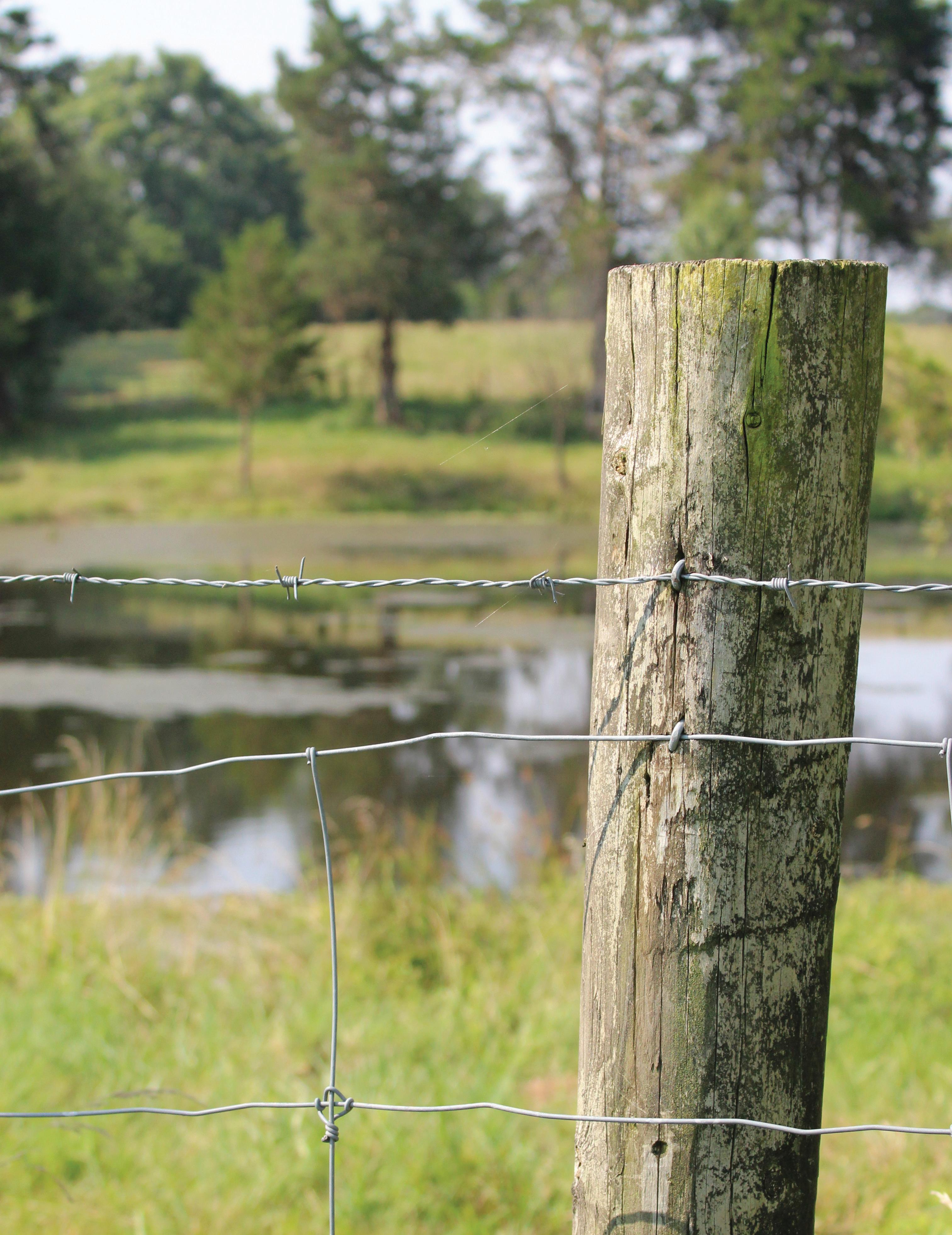
Farm Bureau News The Voice of Virginia’s Agricultural Producers
SEPTEMBER 2023
PUBLICATION SCHEDULE
Producer members will receive their next issue of Virginia Farm Bureau News in November. The magazine is published quarterly, and back issues can be viewed at issuu. com/virginiafarmbureau
Volume 82, Number 3
September 2023
Virginia Farm Bureau News (USPS 017763) (ISSN 1525-528X) is published four times a year. January, April, September, November. It is published by Virginia Farm Bureau Federation, 12580 West Creek Parkway, Richmond, VA 23238. Periodicals postage rate is paid at Richmond, VA and additional mailing offices. The annual Subscription Rate is $1.13 (included in membership dues).
Postmaster: Please send changes of address to, Virginia Farm Bureau Federation, Farm Bureau News, P.O. Box 27552, Richmond, VA 23261-7552; fax 804-290-1096. Editorial and business offices are located at 12580 West Creek Parkway, Richmond, VA 23238. Telephone 804-290-1000, fax 804-290-1096. Email virginiafarmbureaunews@vafb.com. Office hours are 8 a.m. to 4:30 p.m., Monday through Friday.
Members — Address change? If your address or phone number has changed, or is about to change, contact your county Farm Bureau. They will update your membership and subscription information.
All advertising is accepted subject to the publisher’s approval. Advertisers must assume liability for the content of their advertising. The publisher assumes no liability for products or services advertised. The publisher maintains the right to cancel advertising for nonpayment or reader complaints about services or products.
Member: Virginia Press Association
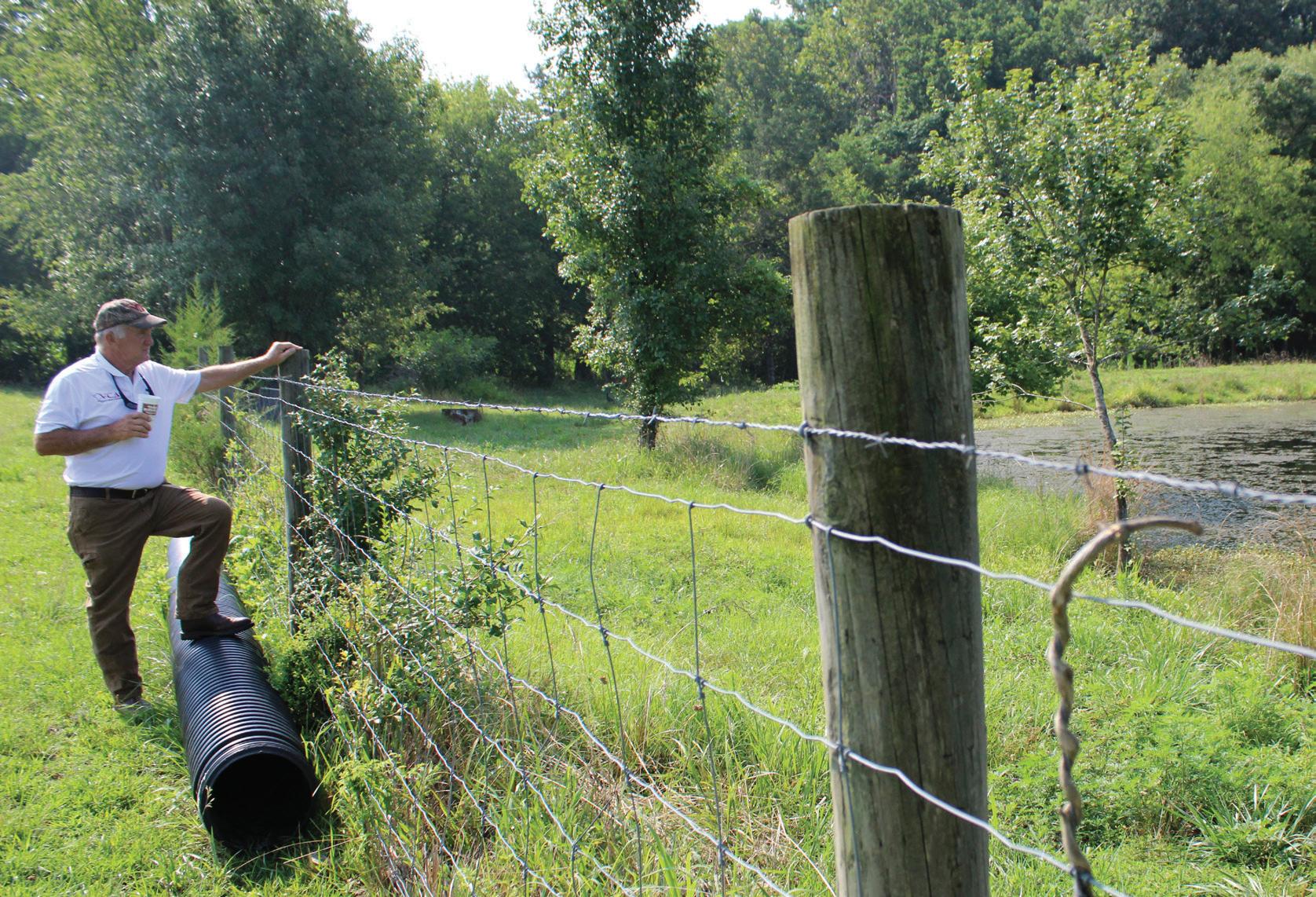
EDITORIAL TEAM
Pam Wiley Vice President, Communications
Kathy Dixon Managing Editor
Nicole Zema Sr. Staff Writer/Photographer
Christina Amano Dolan Staff Writer/ Photographer
Eleanor Stickley Graphic Designer
Maria La Lima Graphic Designer
Alice Kemp Sr. Staff Writer/Advertising Coordinator
VIRGINIA FARM BUREAU FEDERATION
Officers
Wayne F. Pryor, President
Scott E. Sink, Vice President
Board of Directors
DIRECTOR DISTRICT COUNTY
Emily F. Edmondson 1 Tazewell
Richard L. Sutherland 2 Grayson
Bruce N. Stanger 3 Montgomery
Jeannie L. Dudding 4 Craig
Russell L. Williams II 5 Rockbridge
Justin Pence 6 Shenandoah
WE’RE SOCIAL!
Thomas E. Graves 7 Orange
Leigh H. Pemberton 8 Hanover
William F. Osl Jr. 9 Cumberland
Robert J. Mills Jr. 10 Pittsylvania
J. M. Jenkins Jr. 11 Lunenburg
J. Barry Bates 12 Essex
M. L. Everett Jr. 13 Southampton
David L. Hickman 14 Accomack
A. Faye Hundley * Essex
Michelle Fox ** Tazewell
*Women’s Committee Chairman
**Young Farmers Committee Chairman
2 VIRGINIA FARM BUREAU NEWS 10 Owning Their Narrative Women’s Leadership Conference attendees were urged to take credit for their roles in operating Virginia’s farms. 12 Young Leaders Recognized Enterprising Young Farmers were honored for their achievements, and others enhanced their leadership skills at this year’s Summer Expo. 16 BMPs Lead to Bay Cleanup Virginia farmers’ voluntary conservation practices are helping restore the nation’s largest estuary and its watershed. 20 Farm Bill Passage Necessary Farm Bureau members are emphasizing the importance of the 2023 Farm Bill for all Americans, and are urging legislators to pass it. Departments 5 Save the Date 14 For Your Benefit 28 Heart of the Home Features ON THE COVER Fencing cattle out of streams is a common conservation practice
Farm Bureau News
(Photo by Nicole Zema).
16
“We need accurate metrics for (conservation) practices being maintained.”
— JIM RIDDELL , Louisa County cattleman
Conservation challenge is one Va. farmers are ready to meet
Because farming is unpredictable and weather-dependent, many farmers face daily trials. But they are always up for a challenge, and I’d like to offer one more. This challenge will have long-reaching benefits for our farms and waterways, and for all Virginians.
Recently passed legislation from Sen. Emmett Hanger, R-Augusta, and Del. Michael Webert, R-Fauquier, extended agriculture-focused Chesapeake Bay cleanup requirements to 2028 before mandatory practices are required. This is good, because no farmers want government to dictate how they run their farms. Between now and 2028, farmers are encouraged to voluntarily adopt conservation practices that will help reduce nitrogen, phosphorous and sediment runoff into the bay and its tributaries.
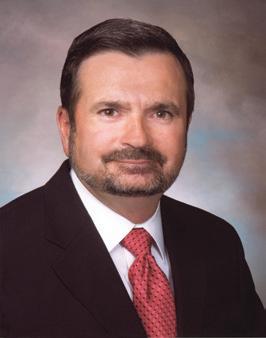
These practices include installing fencing along streams to keep livestock from entering them, developing a farm nutrient management plan, or planting tree buffers to collect nutrient and sediment runoff before it enters waterways. These are conservation methods that farmers may already want to implement, but don’t have the resources to do so.
The legislation also includes a provision that if the legislature doesn’t provide sufficient funding for the cost-share program, the deadline will be extended. An advisory group will annually review progress on the number of practices implemented, what more needs to be done, the number of operators within each region and the consequences of funding shortfalls. This review will help determine how close we are to meeting the agriculture nutrient reduction goals. Fortunately, the General Assembly is committed to fully funding the amount needed to provide farmers with resources to reach the required reductions.
While the General Assembly and Gov. Glenn Youngkin proposed amendments to the commonwealth’s biennial budget to increase funding to help farmers install conservation practices, talks regarding these amendments had stalled as of press time. However, the adopted budget for this fiscal year includes over $130 million in cost-share funds, which is available through local soil and water conservation districts.
Cost-share practices apply to cropland, pastureland, hay fields and forested land. Some are paid for at a flat rate or per-acre rate. Others qualify for cost-share funding on a percentage basis. In some cases, the U.S. Department of Agriculture also pays a percentage. The Agricultural BMP Cost-Share Program’s practices often are funded by a combination of state and federal funds, reducing your overall expenses.
Because demand for cost-share assistance is great, SWCDs support the implementation of plans that meet local water quality guidelines. An individual may receive a maximum of $300,000 per year for cost-share practices.
It’s best to contact your local SWCD to make a plan for implementing new practices or expanding existing ones. District employees will work one-on-one with you to help determine the best practices for your farm.
These practices not only improve water quality, but also increase farm productivity by conserving soil and making wise use of fertilizers and other farm resources.
So, are you up to the challenge?
Top membership counties for 2023
as of August 14
vafb.com / SEPTEMBER 2023 3
President's Message
Wayne F. Pryor, a Goochland County hay and grain producer, is president of Virginia Farm Bureau Federation.
County Farm Bureau Members Bedford 2,926 CC-JC-NK-Y 2,824 Washington 2,794 Hanover 2,675 Tazewell 2,494 Augusta 2,362 Franklin 2,339 Russell 2,276 Henrico 2,245 Rockingham 2,234 County Farm Bureau Percentage of goal Fluvanna 95.98 Floyd 95.53 Henry 95.39 Warren 95.00 Pittsylvania 93.98 Albemarle 93.69 Nelson 93.41 Orange 92.88 King George 92.79 Mecklenburg 92.47 County Farm Bureau Member retention rate % Charlotte 89.47% Fluvanna 89.01% Floyd 88.61% Clarke 88.03% Buckingham 87.73% Surry 87.73% Giles 87.52% Greensville 87.28% Pulaski 87.22% Shenandoah 87.08% *Membership
Oct. 31, 2023.
year ends
WATCH US!
State Fair promoting ag superhero trading cards, on Real Virginia
Featured this month on Real Virginia, Virginia Farm Bureau’s weekly television program:
• Farmers are the “superheroes” featured on trading cards that will be distributed at this year’s State Fair of Virginia.
• Young and old fans of vintage farm equipment are working together on a 4-H antique tractor project in Southwest Virginia.
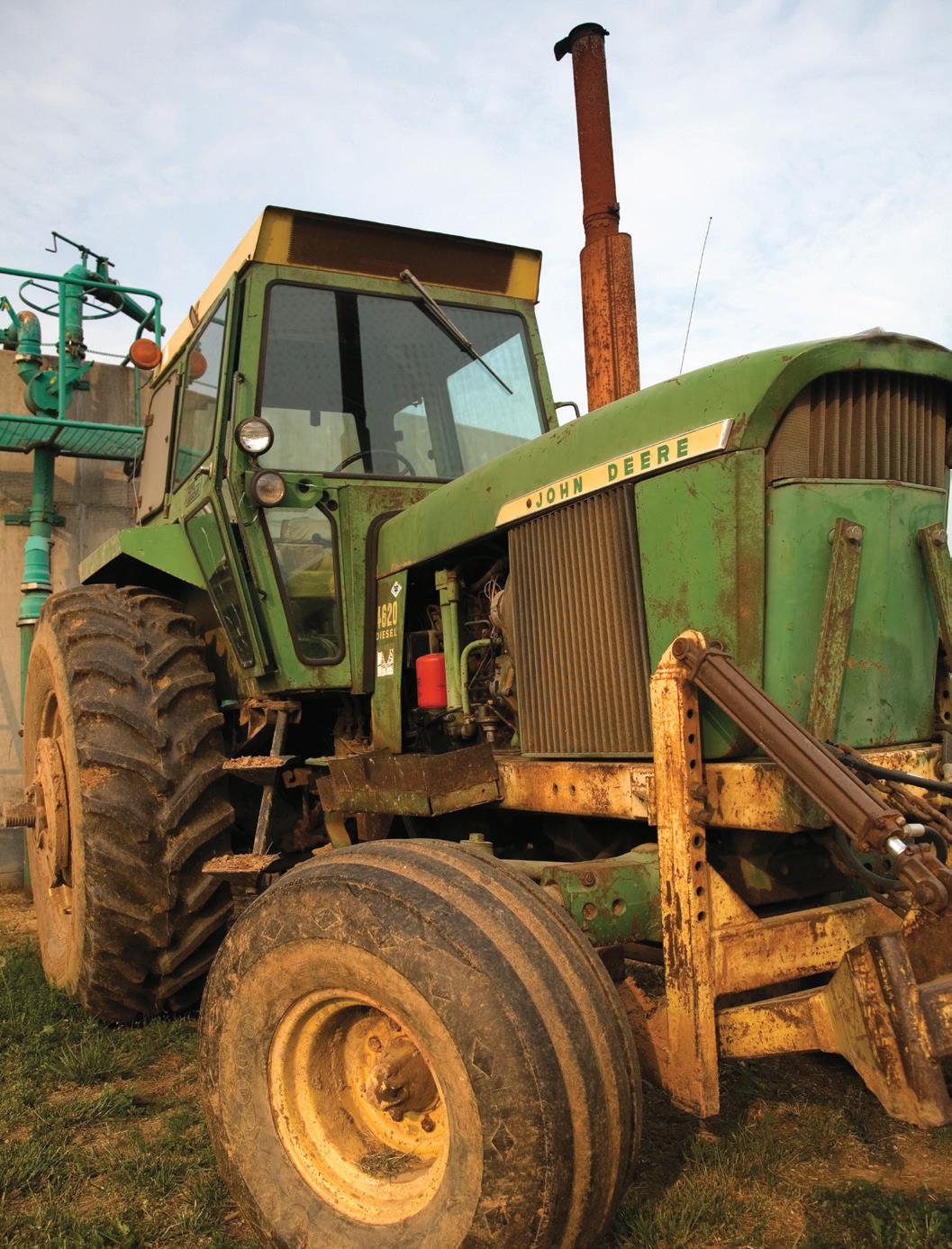
• Discover what farmers in Floyd County are raising, on this month’s County Agricultural Close-up
Real Virginia airs nationwide at 3:30 p.m. on the first Saturday of each month on RFD-TV on Dish Network and DirecTV, and on selected cable outlets around the state. It airs weekly on WBRA digital channel 15.2, WHRO Norfolk, WVVA Bluefield and WTKR Norfolk, and on the first and third weekends of each month on WVIR Charlottesville, WSVF Harrisonburg, WRLH Richmond and WSLS Roanoke.
Annual Hay Bale Decorating Contest open for entries
The Virginia Farm Bureau Federation Women’s Leadership Committee is accepting entries for the popular Hay Bale Decorating Contest through Nov. 15.
Now in its ninth year, the fun, creative competition is open to county Farm Bureaus, farmers markets, farm supply businesses, student groups, community associations and others. Guidelines and an entry form are available at bit.ly/3KCO8TE
Competitors can use round or square bales and other agricultural items to create animals, structures, shapes and farmscapes. Participants are asked to submit photos of their displays with each application.
Winning decorators will be selected and receive a cash award in the following categories: junior (8 and younger); square bale display; community spirit; and most creative. This year also will have a special themed category, “Stars of Agriculture,” in which participants are invited to decorate hay bales like a celebrity or agricultural figure—real or fictional.
Winners will be notified by email or phone. Hay bale photo entries will be displayed at the 2023 VFBF Annual Convention in Virginia Beach in November.
GENERAL ASSEMBLY SEATS
That’s the number of General Assembly seats up for election on Nov. 7–all 100 House of Delegates seats and all 40 Senate seats. See related articles on pages 6-9.
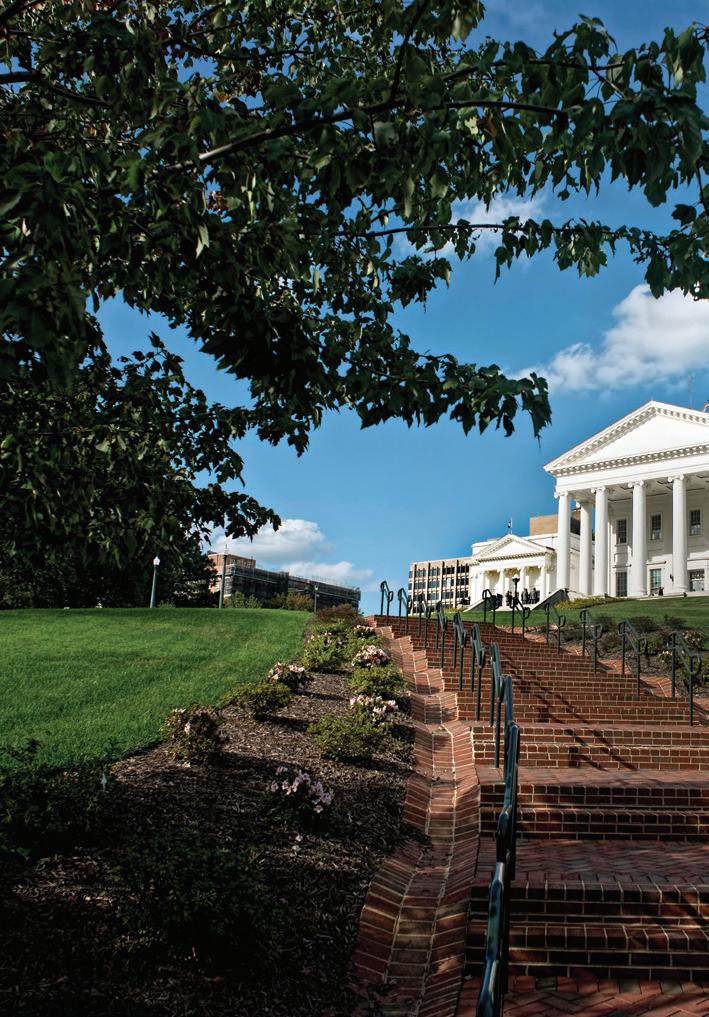
4 VIRGINIA FARM BUREAU NEWS
140
‘Your Fair, Your Way!’ Explore the fun at the State Fair of Virginia
This year’s theme “Your Fair, Your Way,” emphasizes that guests can customize their own adventures. The State Fair of Virginia will be held Sept. 22 through Oct. 1 at The Meadow Event Park in Caroline County.
Among the experiences from which fairgoers can choose are new acts like Dan-Dan the Farmer Man’s comedy show and the Cast in Bronze bell carillon, a unique musical experience featuring the world’s largest and heaviest musical instrument.
Returning crowd-pleasers include master chainsaw carver Ben Risney, two nights of Revenge Roughstock Rodeo Company’s professional bull riding, bronc riding and barrel racing, and the speedy swine at the famed Rosaire’s Royal Racers track.
Music lovers can enjoy a variety of performances, including Motown tribute Brencore Allstars Band, country legend John Anderson and new country artist Megan Moroney. The Crooked Road series also will return.
The fair also is introducing the firstever “Taste of Virginia,” a ticketed event for sampling chef-prepared Virginia foods and beverages at the historic Meadow Hall. Ticket proceeds will benefit the state fair’s scholarship program and Virginia Agriculture in the Classroom.
For a complete list of attractions, events, performers and other details, visit StateFairVa.org.
Get your tickets now!
The best option is to purchase tickets online, but they also can be purchased at the gate.
Farm Bureau members will be treated to a $5 discount off regular admission price on any day of the fair. Visit StateFairVa.org for instructions on how to redeem the discount. The limit is two discounts per transaction per membership.
Register soon for the VFBF Annual Convention in Virginia Beach
The Virginia Farm Bureau Federation 2023 Annual Convention & Meeting of Voting Delegates will be Nov. 27-30 at the Virginia Beach Convention Center, with lodging accommodations at Marriott Virginia Beach Oceanfront and the Embassy Suites Virginia Beach Oceanfront Resort.
Located near the boardwalk, the venue offers tranquil ocean views amid a bustling city. There’s no shortage of things to do, from boardwalk strolls amongst holiday lights to countless dining options, shopping and other attractions.
This year’s convention theme is “Navigating Agriculture’s Future.” The convention is open to all county Farm Bureau members, staff and any member of the public interested in learning more about Virginia agriculture. Registration for lodging and meals is now open to county Farm Bureaus and will close on Nov. 3.

The Annual Meeting of Voting Delegates will take place on Nov. 29. Voting delegates must be producer members and certified by the county Farm Bureaus they will represent no later than Oct. 31. Registration for voting delegates attending the Nov. 29 annual meeting is separate from registering for lodging and meals.
Convention highlights
Most events will take place at the convention center, and the agenda will include invited guests like American Farm Bureau Federation President Zippy Duvall; Jason Brown, former NFL player and current First Fruits Farm owner; and Keighley Gore, 2023 VFBF Distinguished Farm Bureau Woman.
Also on the agenda are legislative updates, policy discussion and workshops covering nontraditional family farm succession planning; legal and economic issues facing American agriculture; and voting delegate orientation.
Delegates certified from each county Farm Bureau will establish VFBF state and federal policies for the coming year, and will vote for directors representing Districts 1, 4, 7, 10 and 13.
Judging will take place for the Young Farmers Discussion Meet and the Virginia FAIRS Agricultural and Forestry Innovation “Bull Pen” Challenge. Winners will be announced during the convention.
Convention events will include presentations of the 2023 VFBF Distinguished Service Award, County Farm Bureau Awards of Excellence and Journalism Awards.
vafb.com / SEPTEMBER 2023 5
Save the Date!
The 2023 Virginia Farm Bureau Federation Annual Convention will be held Nov. 27 through Nov. 30 at Virginia Beach.
© GORDON CAMPBELL-AT ALTITUDE GALLERY
VFBF joins national coalition urging 2023 Farm Bill passage Chincoteague pony trots in as Virginia’s state pony
BY CHRISTINA AMANO DOLAN
Virginia Farm Bureau Federation has joined a national campaign highlighting the necessity of the farm bill’s reauthorization—a message with heightened urgency as the expiration date approaches.
Spearheaded by American Farm Bureau Federation, 20 groups representing agriculture, forestry, wildlife, nutrition and hunger advocates launched the “Farm Bill for America’s Families: Sustaining Our Future” campaign to raise awareness of its profound impact on the well-being of all Americans.
“Virginia Farm Bureau is proud to be a member of the ‘Farm Bill for America’s Families’ campaign,” said VFBF President Wayne F. Pryor. “It is critical that Congress passes a 2023 Farm Bill before the end of the year.
“To make that happen, we must communicate its impact on not only farmers, but every American, our economy and the environment.”
A recent AFBF Morning Consult survey found that over 70% of surveyed adults had not seen, read or heard anything about the farm bill. The survey found that, once learning of its importance, 57% would be more likely to support their member of Congress if they voted to reauthorize the bill. The campaign highlights the farm bill’s importance in five core areas: job creation, food security, conservation, risk management and addressing hunger.
Farm bill programs ensure the survival of a robust food and agriculture industry, which supports 46 million jobs and contributes more than $1 trillion to the U.S. gross domestic product.
The farm bill’s investment in agricultural research and conservation programs allows agriculturalists to lead the way in environmental stewardship. Farmers and ranchers have voluntarily enrolled 140 million acres in conservation programs—equal to the size of California and New York combined.
Managing risk on the farm is crucial in keeping food on our tables—especially with weather disasters, high supply costs and inflationary pressures. Farm bill risk management programs are essential to helping farmers survive these everchanging circumstances.
The farm bill also helps provide food for those experiencing food insecurity. Nutrition programs like the Supplemental Nutrition Assistance Program, formerly known as the Food Stamp Program, helps supply more than 9 billion meals annually to 21 million U.S. families.
By supporting economic and rural development, the farm bill additionally strengthens rural communities and small businesses. It also supports rural infrastructure like broadband, which is critical to equitable education and health care.
Reauthorized every five years, the 2018 Farm Bill is set to expire Sept. 30. Without reauthorization, farming and food security in the U.S. would be heavily impacted: ending some commodity support programs; reverting others to their outdated framework; and stripping the opportunity to modernize key programs.
“The farm bill provides the framework for risk management tools, farm programs and conservation initiatives used by farmers, but it goes far beyond that to impact every American,” Pryor said.
See related article on page 20.
BY ALICE KEMP
Virginia has a state bird, insect, tree, and even a state bat. And now, thanks to an Accomack County 4-H student, the commonwealth has an official state pony—the Chincoteague pony.
Of the laws that took effect on July 1, possibly the most heartwarming was one naming the Chincoteague pony as the state’s official pony. The effort was spurred by 17-year-old Sophia Gallivan, a student at Broadwater Academy on the Eastern Shore.
“My dad and I were driving home from a horse show, and we were talking about iconic things from each state,” said Gallivan, who is a horse enthusiast and member of the Chincoteague Pony Drill Team. “The Chincoteague pony is such a Virginia icon that I thought it was probably the state pony, but then we found out it wasn’t recognized at all. I was like, ‘This has to be done.’”
Backed by the Chincoteague Volunteer Fire Company—the organization that manages the legendary wild ponies—Gallivan contacted her local representatives, Del. Robert Bloxom, R-Accomack, and Sen. Lynwood Lewis, D-Accomack. They introduced matching bills during the 2023 General Assembly.
Her efforts succeeded, and the bills passed with overwhelming bipartisan support in the House and Senate. Gov. Glenn Youngkin signed the legislation into law March 27.
“It’s just fabulous,” said Julie Williamson, an equestrian and member of the Virginia Farm Bureau Federation Equine Advisory Committee. “We’re the only people in the world who have these Chincoteague ponies, and I think it’s so cool that a 17-year-old made this happen … it makes me proud as a horse person.”
6 VIRGINIA FARM BUREAU NEWS
AgPAC team helps farmers connect with candidates as General Assembly braces for massive turnover
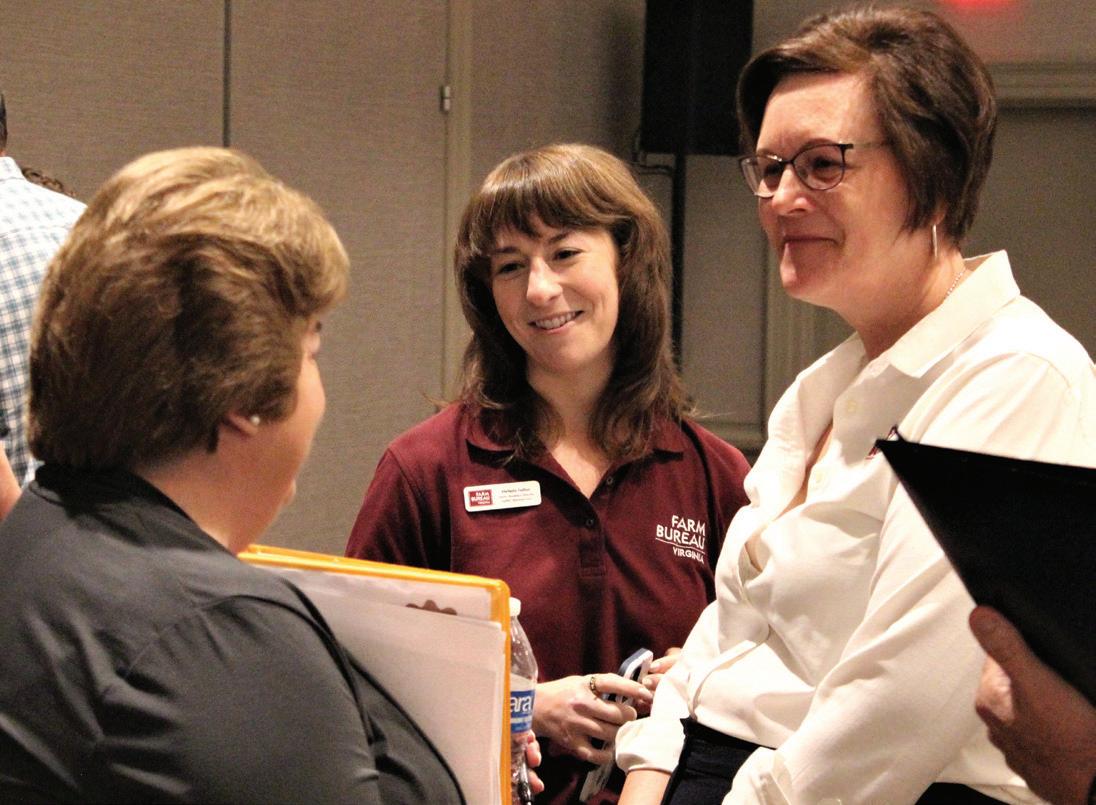 BY NICOLE ZEMA
BY NICOLE ZEMA
The work of one small Virginia Farm Bureau Federation department has a big influence on the state’s largest private industry.
As candidates vie for 140 open General Assembly seats ahead of the Nov. 7 election, VFBF’s governmental relations staff has set its endorsement process into motion.
“This is a large number of open seats in the Senate and House of Delegates,” said Stefanie Taillon, Virginia Farm Bureau Federation AgPAC administrator. “It’s a big one since redistricting just occurred.”
This year’s General Assembly turnover is significant, with 100 House of Delegates seats and 40 Senate seats up for grabs. Taillon said 35% to 40% of the turnover is due to redistricting.
Her team is in the relationship business— building rapport with candidates and creating opportunities for face time with farmers who inform them firsthand on agricultural issues.
While the VFBF AgPAC team facilitates those relationships, candidates ultimately are chosen through a complex
grassroots selection process.
‘The willingness to listen’
VFBF AgPAC is a political action committee that oversees the endorsement process beginning in early spring, governed by a board of trustees. Fourteen district trustees are elected by their peers at every VFBF Annual Convention, and three more are appointed by VFBF President Wayne F. Pryor. That board makes final endorsement decisions based on the findings of local evaluation committees that conduct candidate interviews.
Questionnaires on current ag issues and relevant industry topics are developed by the board of trustees.
“An ag background goes a long way,” Taillon said of candidates. “Some have more knowledge about farming and rural issues than others, so the questionnaire is designed to educate candidates while also finding out what they know. If they are chosen for an interview, they get an additional set of questions for county Farm Bureau members to ask during that process. Just the willingness to listen and making the effort to be
there is important to our members!”
VFBF AgPAC summer intern Haley Bennett, a Virginia Tech graduate pursuing a master’s in public administration, was brought on board to assist with the process. She compiled background information on friendly incumbents, evaluated by county Farm Bureaus.
“You’re not guaranteed an endorsement just because you had one last time,” Taillon said.
Endorsements are designed as a grassroots process because what might be an important issue in Southwest Virginia might not be on the Eastern Shore, said Martha Moore,
senior vice president of governmental relations. The process also provides a leadership opportunity for members interested in advocacy.
“Our members have the early opportunity to build a relationship with candidates,” Moore said. “A lot of times that participation opens other doors. When policy issues come up, it helps lawmakers connect the dots.”
How candidates lean on non-agricultural political issues is inconsequential in the VFBF AgPAC process, Moore added.
“Endorsements are based on candidate positions only as related to our policy book.”
vafb.com / SEPTEMBER 2023 7 paid advertisement
Senior vice president of governmental relations Martha Moore and AgPAC administrator Stefanie Taillon foster connections at a Women’s Leadership Committee conference roundtable.
ALICE KEMP
VFBF AgPAC endorses 101 candidates for General Assembly seats
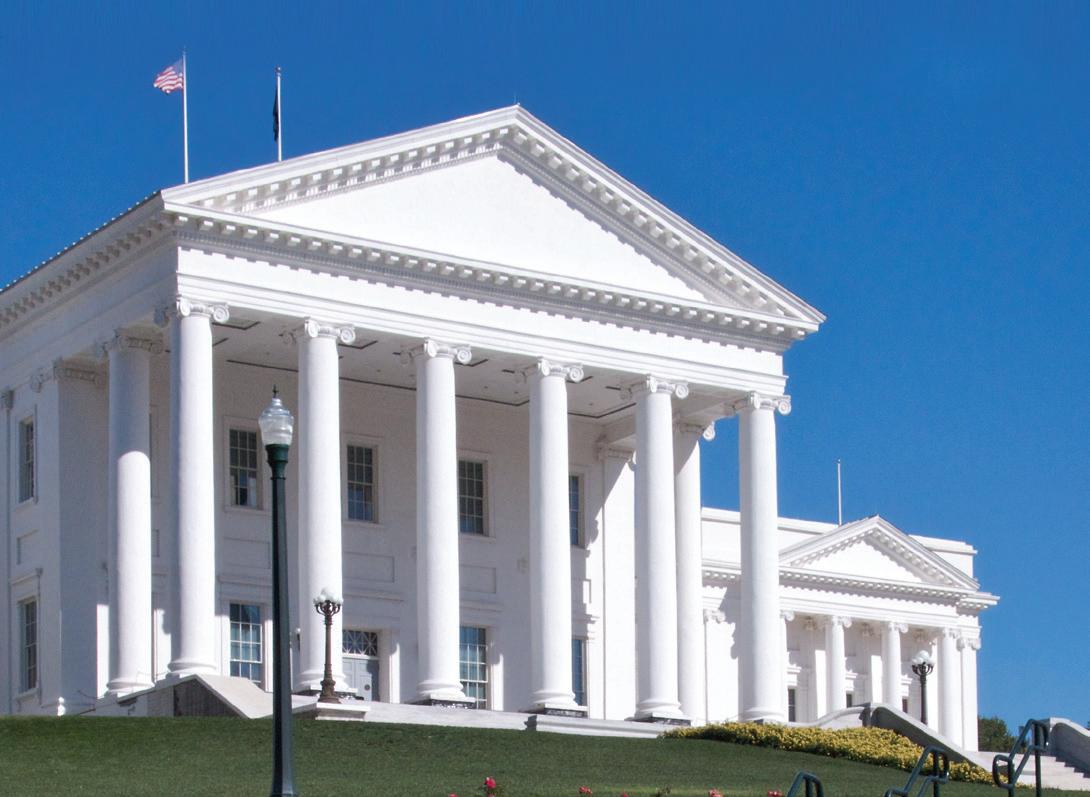
Virginia Farm Bureau Federation AgPAC, Farm Bureau’s political action committee, announced in mid-August its endorsement of 32 candidates for the Virginia Senate and 69 candidates for the Virginia House of Delegates. Although Farm Bureau did not endorse some candidates, the organization felt that it is keeping an open door with those legislators and is looking forward to working with them.
The endorsements are based on recommendations of local committees of farmers. “Candidates are evaluated through a grassroots process that assesses their understanding of the needs and challenges that we as farmers face in today’s times,” said Wayne F. Pryor, VFBF president and chairman of the VFBF AgPAC board of trustees. “Those who have received the AgPAC endorsement have a history of supporting issues important to agriculture or have demonstrated their commitment through their participation in the evaluation process.
“We believe these candidates will help protect the agriculture and forestry industries and ensure that they remain the No. 1 industries in the commonwealth.”
The non-partisan VFBF AgPAC was created in 1999 and employs in-kind contributions and endorsements to support candidates who can best support agriculture and Farm Bureau issues.
The following candidates were endorsed (* indicates incumbent candidates):
Endorsed for Virginia Senate
SD1 Timmy French (R)
SD2 Mark Obenshain* (R)
SD3 Christopher Head (R)
SD4 Dave Suetterlein* (R)
SD5 Travis Hackworth* (R)
SD6 Todd Pillion* (R)
SD7 Bill Stanley* (R)
SD8 Mark Peake* (R)
SD9 Frank Ruff* (R)
SD10 John McGuire (R)
SD11 Creigh Deeds* (D)
SD12 Glen Sturtevant (R )
SD13 Lashrecse Aird (D)
SD15 Ghazala Hashmi* (D)
SD16 Siobhan Dunnavant* (R)
SD17 Emily Brewer (R)
SD18 Louise Lucas* (D)
SD19 Christie New Craig (R)
SD20 Bill DeSteph* (R)
SD21 Angelia Williams Graves (D)
SD23 Mamie Locke* (D)
SD24 Monty Mason* (D)
SD25 Richard Stuart* (R)
SD26 Ryan McDougle* (R)
SD27 Tara Durant (R)
SD28 Bryce Reeves* (R)
SD29 Jeremy McPike* (D)
SD34 Scott Surovell* (D)
SD35 Dave Marsden* (D)
SD38 Jennifer Boysko* (D)
SD39 Adam Ebbin* (D)
SD40 Barbara Favola* (D)
Endorsed for Virginia House of Delegates
HD1 Patrick Hope* (D)
HD3 Alfonso Lopez* (D)
HD4 Charniele Herring* (D)
HD5 Elizabeth BennettParker* (D)
HD6 Rip Sullivan* (D)
HD8 Irene Shin* (D)
HD9 Karrie Delaney* (D)
HD10 Dan Helmer* (D)
HD11 David Bulova* (D)
HD12 Holly Seibold* (D)
HD14 Vivian Watts* (D)
HD16 Paul Krizek* (D)
HD17 Mark Sickles* (D)
HD18 Kathy Tran* (D)
HD20 Michelle Maldonado* (D)
HD25 Briana Sewell* (D)
HD26 Kannan Srinivasan (D)
HD27 Atoosa Reaser (D)
HD28 David Reid* (D)
HD31 Delores Oates (R)
HD32 Bill Wiley* (R)
HD33 Todd Gilbert* (R)
HD34 Tony Wilt* (R)
HD35 Chris Runion* (R)
HD36 Ellen Campbell* (R)
HD37 Terry Austin* ( R)
HD38 Sam Rasoul* (D)
HD39 Will Davis (R)
HD40 Joe McNamara* (R)
HD42 Jason Ballard* (R)
HD43 Will Morefield* (R)
HD44 Israel O’Quinn* (R)
HD45 Terry Kilgore* (R)
HD46 Jed Arnold (R)
HD47 Wren Williams* (R)
HD48 Les Adams* (R)
HD49 Danny Marshall* (R)
HD50 Tommy Wright* (R)
HD52 Wendell Walker* (R)
HD53 Tim Griffin (R)
HD56 Tom Garrett (R)
HD59 Buddy Fowler* (R)
HD60 Scott Wyatt* (R)
HD61 Michael Webert* (R)
HD62 Nick Freitas* (R)
HD63 Phillip Scott* (R)
HD64 Paul Milde (R)
HD66 Bobby Orrock* (R)
HD67 Hillary Pugh Kent (R)
HD68 Keith Hodges* (R)
HD69 Chad Green (R)
HD70 Shelly Simonds*(D)
HD71 Amanda Batten* (R)
HD72 Lee Ware* (R)
HD73 Mark Earley Jr. (R)
HD74 Mike Cherry* (R)
HD75 Carrie Coyner* (R)
HD78 Betsy Carr* (D)
HD81 Delores McQuinn* (D)
HD82 Kim Taylor* (R)
HD83 Otto Wachsmann* (R)
HD86 A.C. Cordoza* (R)
HD88 Don Scott* (D)
HD90 Jay Leftwich* (R)
HD91 Cliff Hayes* (D)
HD97 Karen Greenhalgh* (R)
HD98 Barry Knight* (R)
HD99 Anne Ferrell Tata* (R)
HD100 Rob Bloxom Jr.* (R)
* Incumbent
8 VIRGINIA FARM BUREAU NEWS
Women’s Leadership Committee builds lasting partnerships with legislators
BY CHRISTINA AMANO DOLAN
The Virginia Farm Bureau Federation Women’s Leadership Committee is strengthening relations between agriculturalists and legislators—building trust, partnerships and a sustainable future for the state’s largest industry.
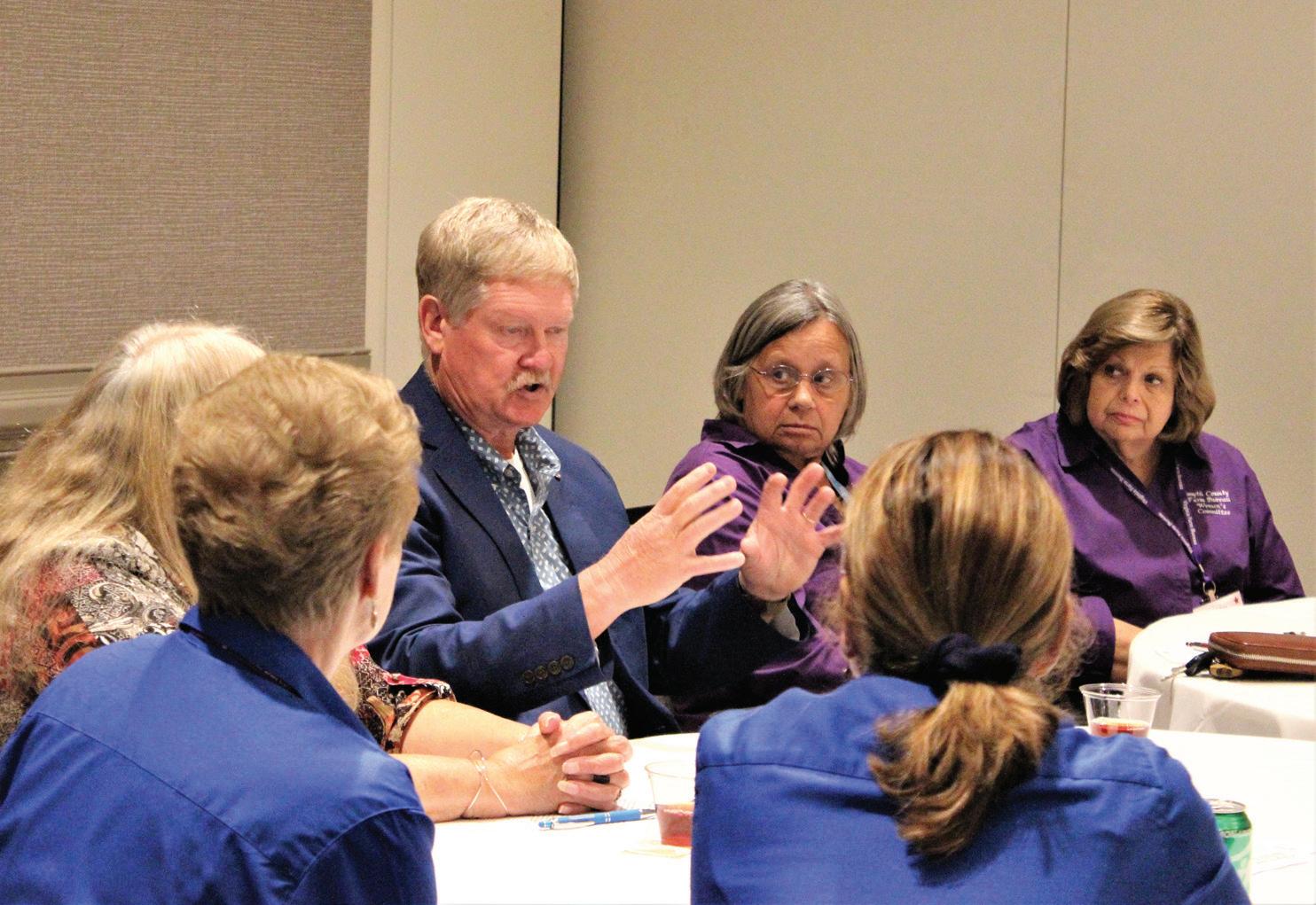
This year, VFBF Women welcomed U.S. Rep. Jen Kiggans, R-2nd, to the committee’s March conference in Virginia Beach.
Committee chair Faye Hundley said “it was an honor” hosting Kiggans, who shared her journey into leadership and how she best represents the interests of her constituents in Virginia’s 2nd congressional district.
Talking with members of Congress during Farm Bill roundtables this spring is another way the committee shares the struggles of women in agriculture and serves as resources for the legislators. Committee members had the opportunity to participate in roundtables with congressional representatives Ben Cline, Kiggans and Abigail Spanberger, and Senators Mark Warner and Tim Kaine.
The Women’s Leadership Committee also has taken a leadership role in Farm Bureau’s Legislative Day at the Capitol each January. Beginning in the late ’60s, the committee sponsored a legislative reception while the General Assembly was in session. In 2017, the reception morphed into providing lunch for legislators as they walked over to session. For the last couple of years, members of the Young Farmers Committee helped the committee serve the meal. This past year, Gov. Glenn Youngkin stopped by and took to-go meals for members of his staff and Cabinet.
In late July, women’s committee members joined in candid discussions during the 2023 VFBF Young Farmers Summer Expo. Participants at the Expo explored key issues facing Virginia’s young farmers and the agriculture industry.
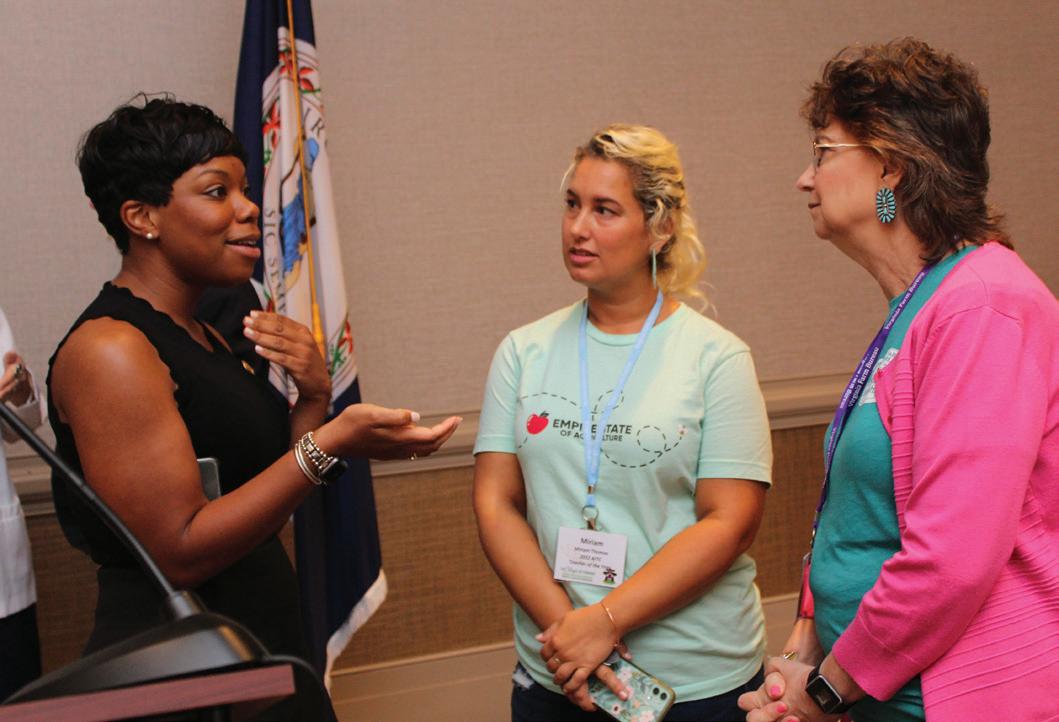
“Legislative engagement has always been a focus of the Women’s Leadership Committee,” Hundley
said. “Now, more than ever, it’s important that we make strong connections with our political leaders to become their trusted resources on agriculture issues.”
Visit vafb.com for more information on the VFBF Women’s Leadership Program, including program achievements, upcoming events and legislative policies.
vafb.com / SEPTEMBER 2023 9
Above, Del. Tony Wilt, R-Harrisonburg, discusses agriculture with women’s committee members during a roundtable legislative discussion. VFBF Women’s Committee members chat with Del. Briana Sewell, D-Woodbridge, during a legislative roundtable at the 2022 Women’s Leadership Conference.
ALICE KEMP
NICOLE ZEMA
Attendees at women’s leadership conference told to ‘own their narrative’
BY KATHY DIXON
The official theme was “Growing Together from the Mountains to the Ocean,” but the unofficial theme seemed to be “Take More Credit for All You Do.”
Several speakers at the Virginia Farm Bureau Federation Women’s Leadership Conference in March said Farm Bureau Women need to own their part in operating Virginia’s farms.
“Don’t say, ‘My husband is a farmer.’ You are a farmer,” emphasized Tenille Nuckols as she led a session on “Building Your Brand: Positioning Yourself as an Expert in your Field.” Nuckols spoke during the preconference leadership academy, in which 22 women participated.
And during a workshop titled “Establishing the Why,” Logan Yearsley, director of membership engagement for American Farm Bureau Federation, urged women not to say “my husband’s farm” when describing what they do. “You are farmers,” he emphasized to them.
Outstanding Woman in Agriculture named Martha Moore, VFBF senior vice president of governmental relations, told the 230 women in attendance that “you need to own your own voice; your own narrative.” She served as the keynote speaker on Friday night before being honored with the Outstanding Woman in Agriculture Award. Moore “fiercely advocates for farmers every day,” remarked District 10 Women’s Leadership director Kristal Harris.
The award honors women for achievements in and contributions to the agriculture industry.
Moore has been employed by Farm Bureau for 31 years and currently manages the organization’s lobbying efforts at the local, state and national levels. She also focuses on policy issues regarding agriculture education, budget, forestry, land grant institutions and the environment.
She has a long tenure advocating for farmers, and in 2017 she was recognized with the VFBF Warren Beach Award for her efforts to support Farm Bureau’s Young Farmers Program.
In addition to her work with Farm Bureau, Moore serves on Virginia Tech’s College of Agriculture and Life Sciences Leadership Council. She received the Virginia Association of Soil and Water Conservation Districts’ 2020 Friend of Conservation Award, which recognized her exemplary leadership, initiative and dedication to Virginia’s SWCDs.
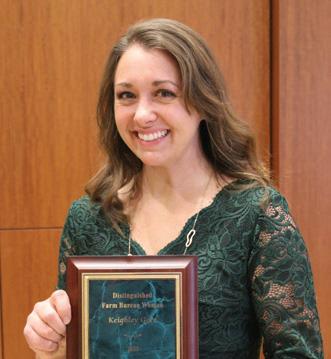
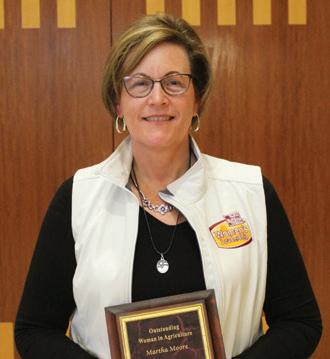
Moore grew up on a tobacco farm in Pittsylvania County, which she now owns, and lives with her family in Louisa County. She holds a bachelor’s degree in political science with a minor in agricultural economics from Virginia Tech.
Distinguished Farm Bureau Woman awarded
Another woman also received accolades during the conference. Keighley Gore of Frederick County was the winner
of the VFBF Distinguished Farm Bureau Woman Award, which honors involvement in a farm or agricultural business, an agricultural leadership role and participation in community activities.
Through her work with the Frederick County Farm Bureau Women’s Committee, Gore has been integral in advocating for agricultural education. Additionally, she serves on the Frederick County Public Schools Agriculture Advisory Board, as well as the Virginia FFA Foundation Board. She also serves on the Frederick County Extension Leadership Council as a member at large.
“I’m excited for the opportunity to learn about all facets of agriculture in Virginia and how women are enhancing each venture—whether it’s leading large farming operations, taking charge of the family farm market, demanding policy change, or raising the next generation of producers,” Gore said. “I’m in awe of the women who advocate for agriculture and will do my best to shine light on their work and inspire others.”
Farm Bureau Ambassador announced
An agricultural advocate was named Virginia Farm Bureau Ambassador during the conference. Tanner Wise of Buckingham County is a Virginia Tech student pursuing a degree in animal and poultry sciences.
The Farm Bureau Ambassador program recognizes young adults for their interest and achievements
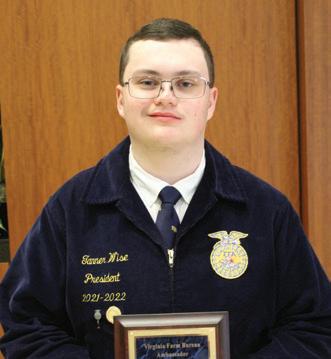
10 VIRGINIA FARM BUREAU NEWS
in agriculture and provides an opportunity for them to serve as spokespersons for agriculture and Farm Bureau. Finalists are nominated by their county Farm Bureaus and develop, present and defend an agriculture-related activity platform or project they will carry out during their tenure.
Wise was named the 2022 Outstanding Young Agriculturalist at last year’s VFBF Young Farmers Summer Expo. Last year he also was named a Virginia 4-H All-Star and received his Virginia FFA State Degree. Additionally, he was named the Virginia FFA Sheep Production Proficiency Award winner and won silver at the National FFA Convention for a Supervised Agricultural Experience project in sheep production. He previously served as president of the Buckingham/ Cumberland 4-H Livestock Club and
president of the Buckingham Senior FFA Chapter.
Tours, workshops educate, enlighten Conference participants had an opportunity to attend Virginia Beach farm tours. They visited Coastal Cattle’s Meat Shack; Salmons, a multigenerational grain farm; and Cullipher Farm Market.
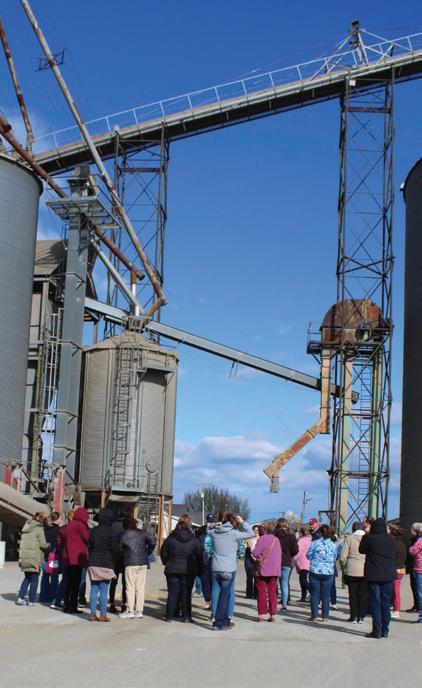
They also learned from Stefanie Taillon, associate director of governmental relations and AgPAC coordinator, that Virginia’s 2023 primary and general elections will be under the new districts created in 2021.
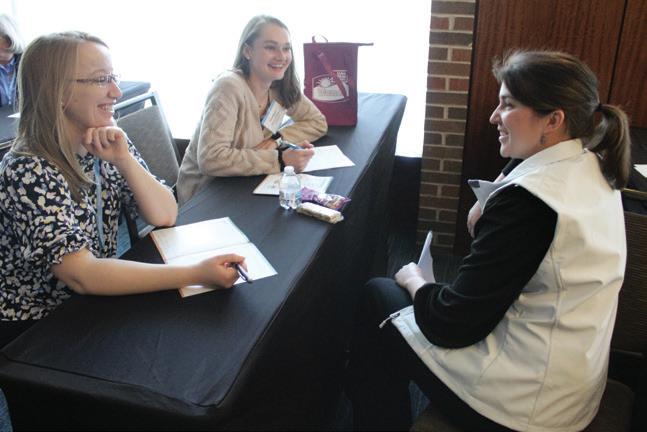
She recommended visiting vpap.org, the website of the nonprofit Virginia Public Access Project, to find out voting details and how redistricting may change your representative.
Other conference workshops topics included dairy marketing, managing stress and work-life balance,
safeguarding animal agriculture and engaging in public outreach.
Speaker praises accomplishments
Saturday night’s keynote speaker was Rep. Jen Kiggans, R-2nd, who told attendees that there is “no stronger group of women than moms.”
She praised Farm Bureau women for reaching out to her and other legislators to help them understand more about agriculture and issues affecting farmers.
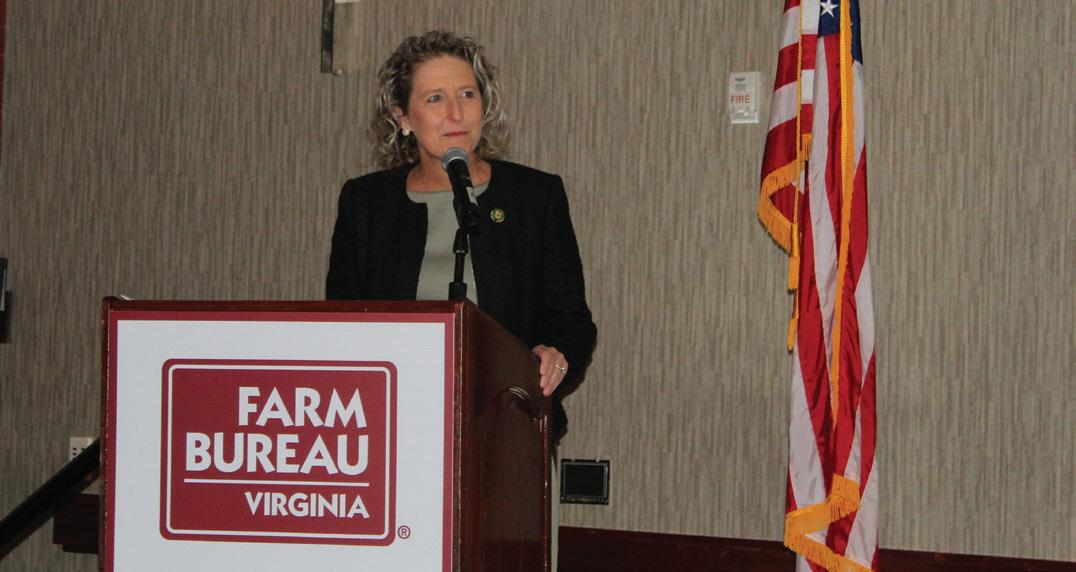


“Keep teaching me,” Kiggans said. The 2024 Women’s Leadership Conference will be held April 26-28 at The Hotel Roanoke & Conference Center.
SAVE
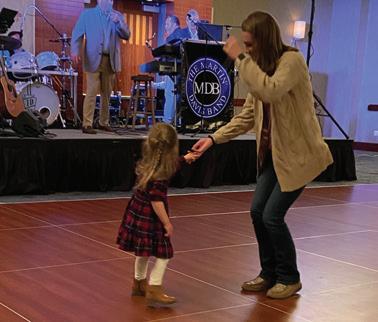
vafb.com / SEPTEMBER 2023 11
Women's conference attendees enjoyed dancing, workshops and tours. They also listened to a fireside chat with American Farm Bureau Federation Young Farmers and Ranchers Committee chair Matt Fimon and VFBF Women's Leadership Commmittee chair Faye Hundley. Keynote speaker Rep. Jen Kiggans, R-2nd, praised Farm Bureau women for their work to educate legislators.
THE DATE
Young Farmers
the Page for Agriculture’ at 2023 Summer Expo
to teach them how to be the architects of their own lives.
BY CHRISTINA AMANO DOLAN
Over 200 young farmers from across the state traveled to Page County July 28-30 for the 2023 Virginia Farm Bureau Federation Young Farmers Summer Expo.
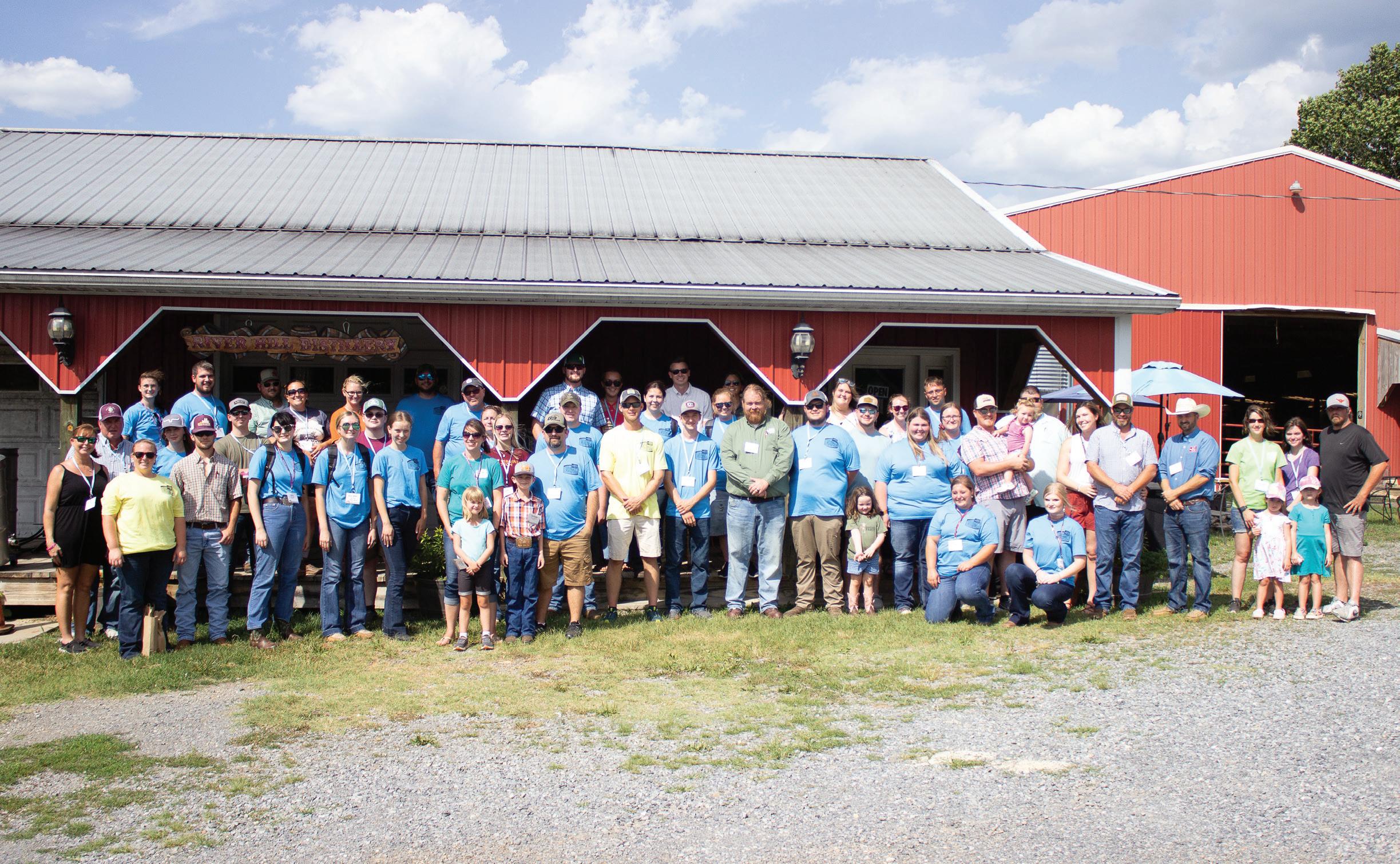
Following the theme of “Turning the Page for Agriculture,” young farmers focused on how they can prepare for the future of their industry.
The expo’s keynote speaker, Rousawn Dozier, shared the power of perseverance and perspective— two essential assets for the next generation of farmers. Dozier is a speaker, business consultant and “mindset architect,” a nickname he earned from his coaching clients. He draws from his own experiences overcoming adversity as he shares inspirational messages with audiences
He recounted a time when he reluctantly climbed treacherous mountains in Colorado, but how he found clarity once he reached the peak and looked down on a breathtaking view.
“When you change the way you see things, the things that you see change,” Dozier said, urging young farmers to practice “looking at obstacles as opportunities to get better.”
Expo workshops and speeches focused on shifting perspectives in agriculture. Topics included planning ahead for retirement, bridging the gap between farmers and consumers, engaging with legislators to address present and future needs, and staying mindful of mental health on the farm.
Tours to area farming operations, including Survivor Farm, River Hill Distillery and Stoney Run Farms, offered participants some different perspectives. Hannah Fink, an
aspiring first-generation farmer, found solace in encountering farmers with successful small-scale and diversified operations.
“It was just really encouraging for me,” Fink said. “I’ve sat for the last two years super excited, wanting to dive in. It made it all less overwhelming to start (farming), and gave me hope for possibilities.”
Goochland County couple wins Excellence in Agriculture Award
Winners of three annual awards were announced during Saturday night’s dinner at Rivercrest Farm in Rockingham County.
Rachel and Thomas Henley of Goochland County were named the 2023 VFBF Young Farmers Excellence
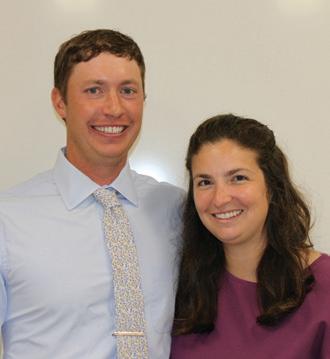
12 VIRGINIA FARM BUREAU NEWS
‘Turn
in Agriculture Award winners.
The award recognizes involvement in agriculture, leadership ability and participation in Farm Bureau and other organizations. The Henleys work on Thomas’ family’s multi-generation dairy and grain farm while running agritourism events, helping others in agriculture and working on local land preservation programs. Rachel also serves as a Virginia Cooperative Extension agent in Powhatan County. They will receive a Kubota utility vehicle and a travel package to the 2024 American Farm Bureau Federation Annual Convention in Salt Lake City in January.
Runner-up Morgan Slaven of Augusta County also will receive a travel package to the AFBF convention.
Halifax County farmer wins Achievement Award
Adam Davis of Halifax County was awarded
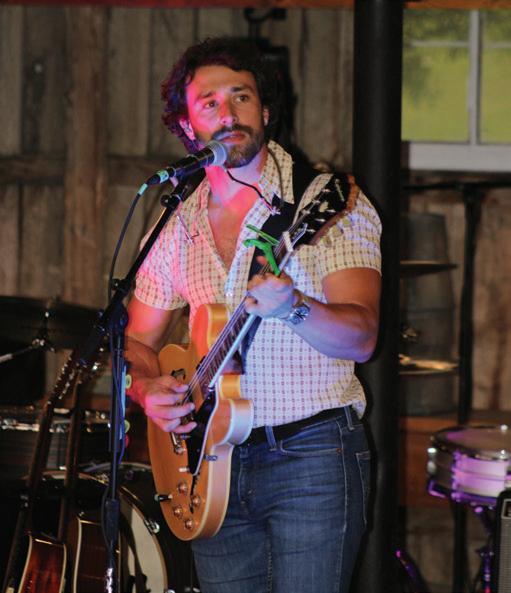
the 2023 VFBF Achievement Award, which recognizes young Farm Bureau members for their efforts and leadership in production agriculture. Davis began farming in 2012 and grows corn, soybeans and wheat and manages a Black Angus cow-calf operation.
He will receive a 250-hour lease on a piece of Kubota equipment, a utility vehicle and a travel package to the 2024 AFBF convention.
Runner-up Nick Moody of Dinwiddie County will receive $750 and a trip to the AFBF convention.

Essex County student named Outstanding Young Agriculturalist
Anne Martz of Essex County was named the 2023 VFBF Outstanding Young Agriculturalist. The recognition program is organized by the VFBF Young Farmers Committee and honors high school juniors and seniors for academic,
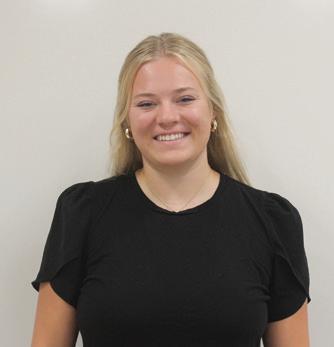
community and agribusiness
achievements.
Martz recently was elected state vice president for Virginia FFA and served as president of her high school’s FFA chapter. She hopes to teach youth “about the industry that keeps our world spinning,” she said. She will receive a $1,500 scholarship and a travel package to the VFBF Annual Convention.
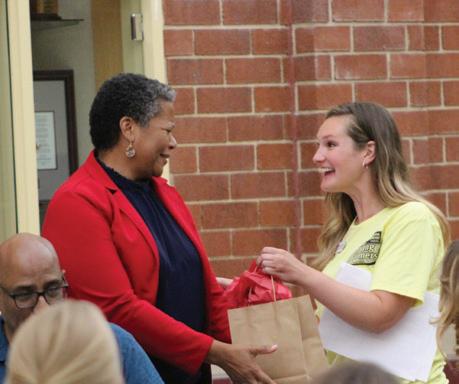
Runner-up McKenzey Kirby of King William County will receive $500.
Discussion Meet finalists to compete at VFBF Annual Convention
Young Farmers also participated in the annual Discussion Meet, which is a simulated committee meeting. Participants are judged on their active participation, understanding of agriculture issues and ability to build consensus on predetermined topics.
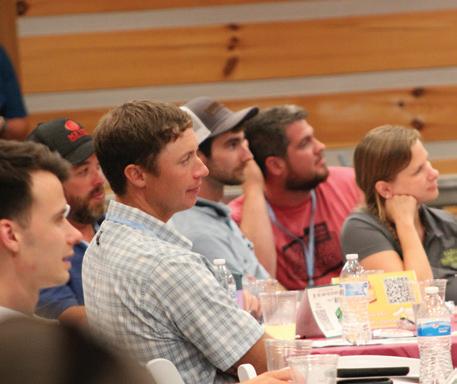

This year’s finalists are Brittany Bowman and Thomas French, both of Shenandoah County, Diaz Tompkins of Chesterfield County and Amanda Weakley-Scott of Madison County. They will compete at the VFBF Annual Convention in Virginia Beach on Nov. 28.
The 2024 VFBF Young Farmers Winter Expo will be held Feb. 23-25 in Richmond.
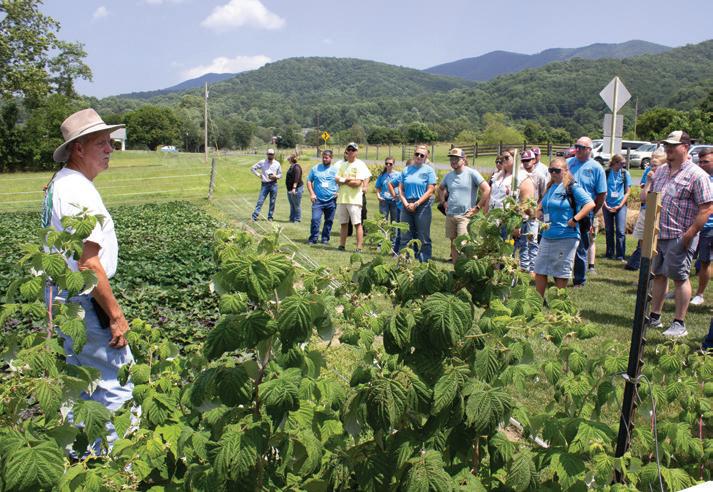
vafb.com / SEPTEMBER 2023 13
During the Summer Expo, VFBF Young Farmers participated in a Discussion Meet competition, talked to legislators, participated in workshops and toured farms. They were entertained by singersongwriter Will Overman and his band.
Farm Bureau members eligible for savings on health benefits
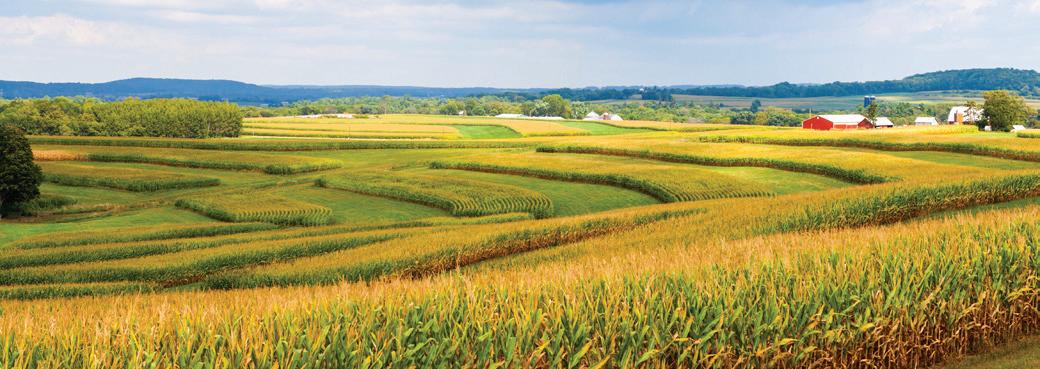
New! Save on the latest hearing aid technology
Great Hearing Benefits works to improve hearing health, which is essential to overall health. The company is comprised of thousands of credentialed hearing care professionals in a nationwide network, providing the latest technology with affordable pricing, award-winning care and record-breaking patient satisfaction. And now Virginia Farm Bureau members can save up to 50% on top hearing aids provided through companies like Beltone, ReSound and Jabra.
To access your savings, visit vafb.com, and go to the “Membership at Work” tab on the lefthand menu.

Save on preventive health screenings
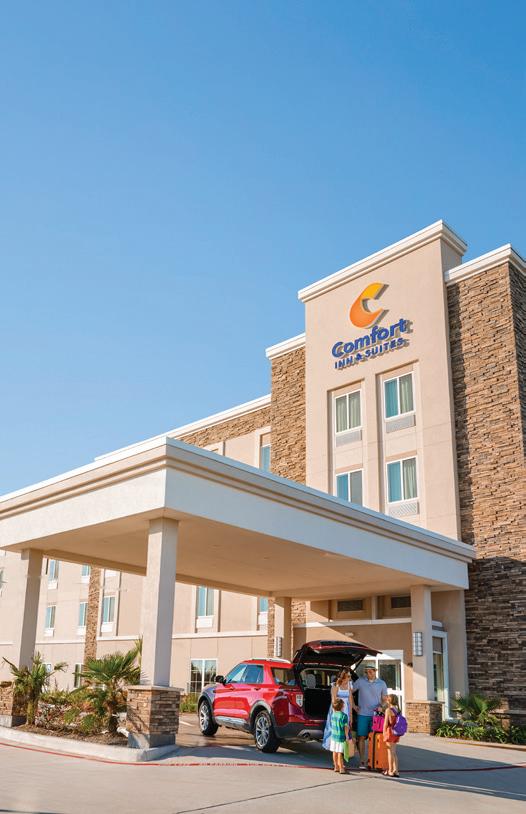
You never know when a cardiovascular issue will arise, so why not get screened to assess your risk?
Virginia Farm Bureau members are eligible for four non-invasive vascular health screenings, to assess risk for stroke, heart attack or bone fractures. For just $135, members can be screened for carotid artery, abdominal aortic aneurysm, atrial fibrillation and peripheral arterial disease. They also receive a free osteoporosis scan.
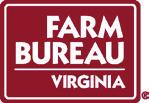
Get discount prescriptions delivered to your door
My Free Pharmacy is offering VFB members a special subscription rate of $17.96 a month for individuals or $26.96 monthly for families.
Members then receive free 21-day supplies of 125 generic acute medications at any pharmacy nationwide and 90-day supplies of chronic care generic medications, with free shipping to your door. They also are eligible to purchase overthe-counter medications at a fraction of the price on chronic care generic medications.
Access the pharmacy helpline at 800-257-8420, or visit myfreepharmacy.com/virginia
Cash Reward* $500
rights reserved.
available features shown.

14 VIRGINIA FARM BUREAU NEWS For Your Benefit Choice Hotels has a variety of brands to
traveler’s needs.
to
Hotels
Wherever the road takes you, Choice Hotels® is there. 3 ways to book your rate: Visit ChoiceHotels.com and enter the Special Rate ID Call 800.4CHOICE and give them the Special Rate ID. Download the Choice Hotels mobile app and enter the Special Rate ID. * The actual discount rate varies by agreement, property and rate plan, and is available at most U.S. Choice Hotels® locations and international locations, but excludes WoodSpring Suites® locations. You must book as directed to receive the stated discount, which is off the hotel’s published BAR rate. The actual BAR (best available) rate varies depending on hotel and time of purchase, is unrestricted, non-qualified and excludes any other discount rates. Unless otherwise stated,
rates
per
per
© 2023 Choice Hotels International, Inc.
*Visit FordRecognizesU.com/FarmBureau today for complete offer details! FORD F-150 Farm Bureau Members Receive a $500 Exclusive Cash Reward*on an Eligible New Super Duty®, F-150®, Ranger® or Maverick® Exclusive
Computer-generated images with
suit every
Use your Virginia Farm Bureau discount
save up to 20%* at nearly 7,500 Choice
worldwide.
quoted
are
room
night, based on single/double occupancy and don’t include taxes, gratuities, or incidental charges. This rate may not be combined with other promotions, offers or discounts and isn’t valid for existing reservations. Hotels are individually owned and operated.
All
Members can score a 10% discount on warehouse products
Virginia Farm Bureau members can enjoy a price cut of 10% off any inventory in stock at the Products Division’s fall open house, Sept. 25-29.
Visit products.vafb.com to view inventory, and call 800-476-8473 to place an order. Discounted products are available through pickup only at the warehouse, located at 1541 Mary St. in Henrico County.
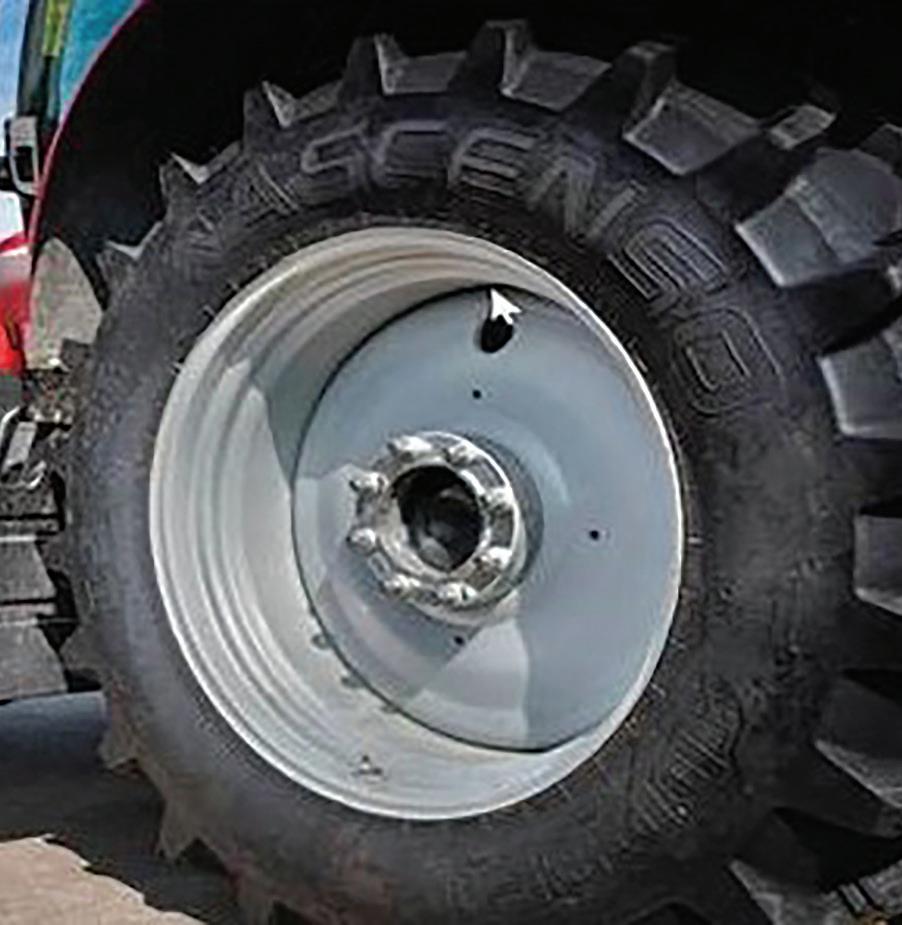
Daryl Butler, director of product services and market development, said the Products Division was started in 1965 to provide quality products at competitive pricing for members.
“The way I think of it, our members are the true owners of our organization,” he said. “We like to give discounts to show the value in their membership—thanking them for supporting Farm Bureau and the Products Division.”

vafb.com / SEPTEMBER 2023 15
greathearingbenefits.com/farmbureau-va Call now to schedule your appointment 1 (877) 680-0499 Great Hearing. Great Benefits. That Simple. As a member of the Virginia Farm Bureau, you have access to the Great Hearing Benefits (GHB) program. GHB provides family members access to hearing care and hearing aids at discounted rates. • Up to 50% below-MSRP pricing on today’s top hearing aid technology • Free 60-day trial. • 3-year warranty and service plan. • 4,500 nationwide locations for free hearing aid service or repair. • If your hearing aids are lost, stolen or damaged within the first three years, we’ll replace your hearing aids! • Share your benefits with up to three immediate family members. 25% OFFonJabra AudioProducts MemberSavingsStartat Members can save on parts for equipment and vehicles – including tires, batteries, oil and more through the VFBF Products Division.
‘On your own terms’
Farmers voluntarily implement best management practices as Chesapeake Bay cleanup deadlines loom
Inching the needle toward goals to restore the nation’s largest estuary and its watershed is happening with the help of farmers—not in spite of them.
Agriculture is a large source of nutrient and sediment pollution entering the Chesapeake Bay, exacerbated by certain farming practices. When added to the nutrients and sediment from urban storm and wastewater sources, a resulting ecological imbalance impacts aquatic life and habitats and harms local and regional economies.
Virginia’s farmers are proving to be national leaders in conservation through the implementation of agricultural best management practices that improve bay water quality. And nobody’s making them do it.

“Not yet anyway,” said Martha Moore, Virginia Farm Bureau Federation senior vice president of governmental relations. “If agriculture does not meet nutrient load reduction goals as court-mandated for the Total Maximum Daily Load, it could result
in practices becoming mandatory for livestock farmers, and anyone managing nutrients on their farm.”
Quantifying the cleanup
The Chesapeake Bay TMDL is a pollution limit enumerated in the largest cleanup plan ever developed by the U.S. Environmental Protection Agency. Watershed Implementation Plans were created by jurisdictions in the 64,000-square-mile, six-state watershed, outlining how they’ll reach pollution-reduction goals through 2025 while submitting 2-year progress milestones.
The program’s pollution load estimates were generated using a Watershed Model that is now in its sixth phase or version. Virginia’s WIP III is based on a recipe of conservation practices that local soil and water conservation districts recommended to achieve the nutrient load reductions.
“There’s a challenge with the model,” Moore asserted. “Practices come to the end of their contract with the Natural Resources Conservation Service or
local SWCDs, and the model appears as though these practices were never implemented on a farm, which is simply not true.”
The EPA will not allow those practices to continue to be counted until an agency representative personally verifies their continued existence on site.
“Producers are doing what we’re asked to do, but a lot of information is missing,” said Louisa County cattleman Jim Riddell. “We need accurate metrics for practices being maintained. I believe agencies are doing their best, but without accurate numbers, we don’t know where we are, or where we need to go. There are modern-day approaches to collect this data, without infringing on the privacy of the farmer.”
Farm Bureau is advocating for various approaches to capture these voluntary measures, which are crucial to the agriculture sector meeting its nutrient reduction loads, Moore added.
The 2022 Chesapeake Bay and Virginia Waters Clean-up Plan
16 VIRGINIA FARM BUREAU NEWS
ARTICLE AND PHOTOS BY NICOLE ZEMA
Louisa County cattleman Jim Riddell said fencing out streams has improved his farming operation as well as local waterways.
reported Virginia made “excellent progress” toward the 2025 nutrientreduction goals, with restoration of underwater grasses. But a significant increase in agricultural BMP implementation is still needed. State and federal cost-sharing incentivizes farmers to do so, especially with historic levels of funding made available for BMP implementation in 2024—a longstanding advocacy priority for VFBF.
“Most farmers do want to do it, while some don’t want to accept monies from the government,” Moore said. “But for us to achieve these nutrient load reductions, we’ve got to get everybody on board.”
Between 2002 and 2021, 35,531 BMPs were installed in TMDL areas, fencing 12 million linear feet of streams and reducing 336,177 annual pounds of nitrogen, according the 2022 cleanup plan report.
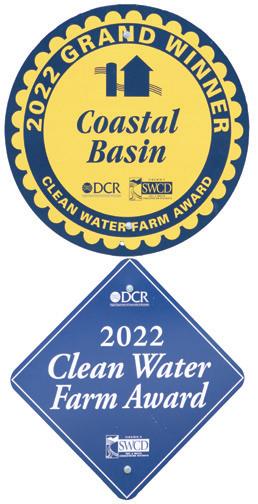
To meet goals in 2025, 75% of the remaining nitrogen pollution reductions must come from the agricultural sector through BMP installment. That won’t happen in time. SB 1129 passed this session, prohibiting certain regulatory actions from being imposed prior to July 1, 2028, provided there’s a plan for reaching the needed number of voluntary incentivized practices.
But that “needed number” to calculate the amount of funds isn’t clear. A stakeholder group will reconvene to examine what remains to be accomplished.
If funding isn’t provided by the General Assembly to meet Needs Assessment funding levels and sufficient technical assistance, that deadline could continue to be pushed up to 2030. DCR officials say they recognize support must come from both the state and farmers to help meet this deadline.
Experts on standby with funding assistance
The Clean-up Plan recommended
widespread implementation of BMPs including nutrient management on cropland, cover crops, animal waste storage, poultry litter transport, conservation planning, grass and forested riparian buffers, and additional livestock stream exclusion.
Virginia’s 47 soil and water conservation districts work directly with farmers to implement the Department of Conservation and Recreation’s Virginia Agricultural Best Management Practices Cost-Share Program, providing technical recommendations and distributing funding.
“We are the one-stop shop for farmers for state cost-share sign-up to fund conservation practices,” said Dr. Kendall Tyree, executive director of the Virginia Association of Soil and Water Conservation Districts. “Districts listen to producers and offer technical assistance and funding options tailored to their farms. And with unprecedented, historical levels of cost share funding of $124.6 million in 2024, our technical staff are truly the boots on the ground assisting producers with conservation implementation.”
Farmers can receive up to $300,000 to adopt practices that keep nutrients, sediments and waste out of streams and rivers. Some are paid for at a flat rate or straight per-acre rate. Others are cost-shared on a percentage basis of up to 100%.
A Whole Farm Approach pilot project began in 2019 and expanded to 12 districts, allowing farmers to submit a single cost share application for a bundle of agricultural BMPs, significantly simplifying the process and increasing participation.
Used in conjunction with state funding sources, the Department of Environmental Quality’s state ag BMP loan program utilizes the Virginia Clean Water Revolving Loan Fund to provide a continuing source of no- or low-cost financing to farmers and SWCDs for implementation. Farmers
also may earn a tax credit from $25,000 to $75,000 for out-of-pocket expenses for agricultural BMPs.
The Conservation Reserve Enhancement Program provides funding to create streamside forested buffers. Through CREP, the Chesapeake Bay Foundation and its partners have planted more than 1,800 miles of streamside buffers in the watershed.
These tools are shown to boost farm productivity and profitability.
“There’s no reason not to do it,” Moore said. “Especially while you still can on your own terms.”
Stay tuned for Part 2. In the November issue of Virginia Farm Bureau News, read about real-life examples of some Virginia farmers who are making a difference by implementing voluntary conservation practices. And learn about researchers who are finding the most effective means of utilizing conservation methods.
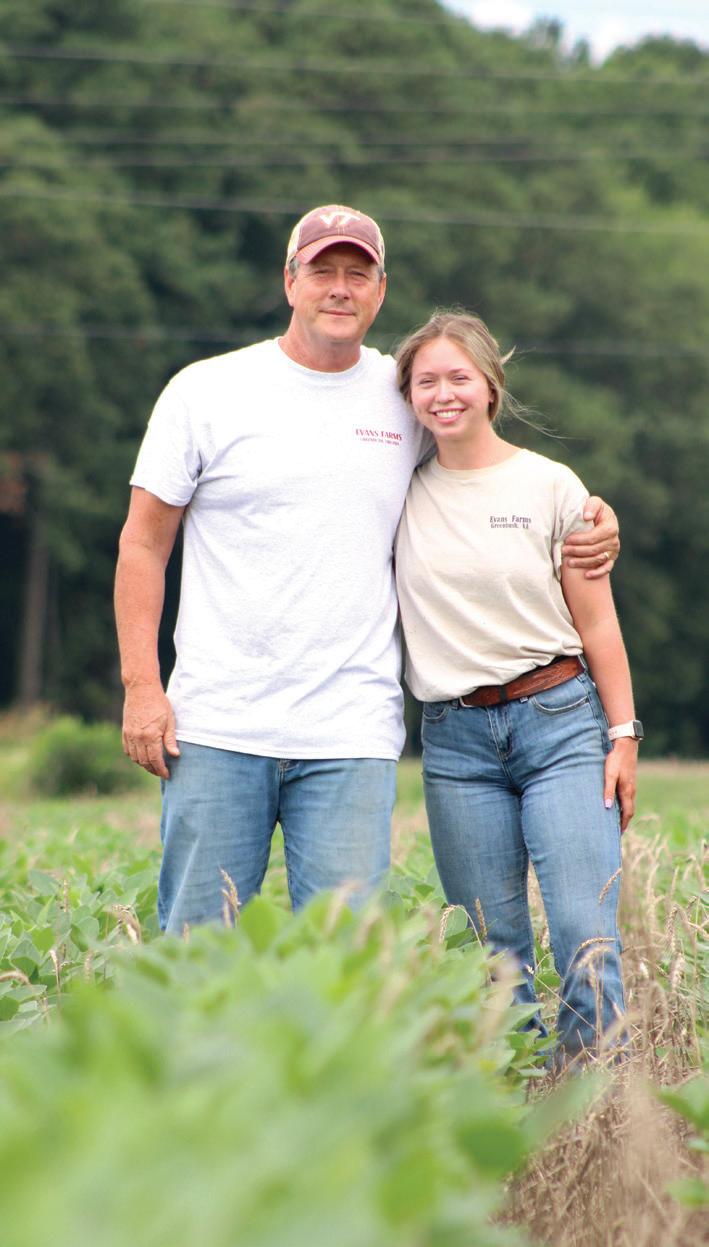
vafb.com / SEPTEMBER 2023 17
Jim and Claire Evans’ Accomack County Evans Farms earned the 2022 Clean Water Farm Award for conservation practices they’ve implemented.
Which of these widely used BMPs would work on your farm?
Standard cover crop practices
> Winter small grains and legumes
Other cover crop practices
> Mixed species, summer cover, “green manures” in vegetable production systems
Stream exclusion/protection practices
> Stream fencing; riparian buffers; alternative watering systems

Nutrient Management Plan writing and nutrient management practices
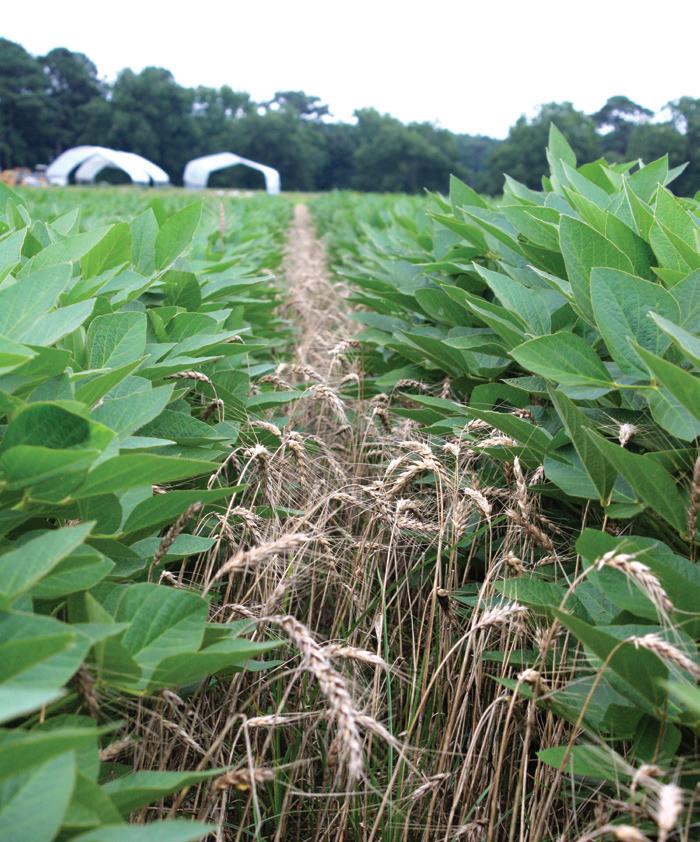

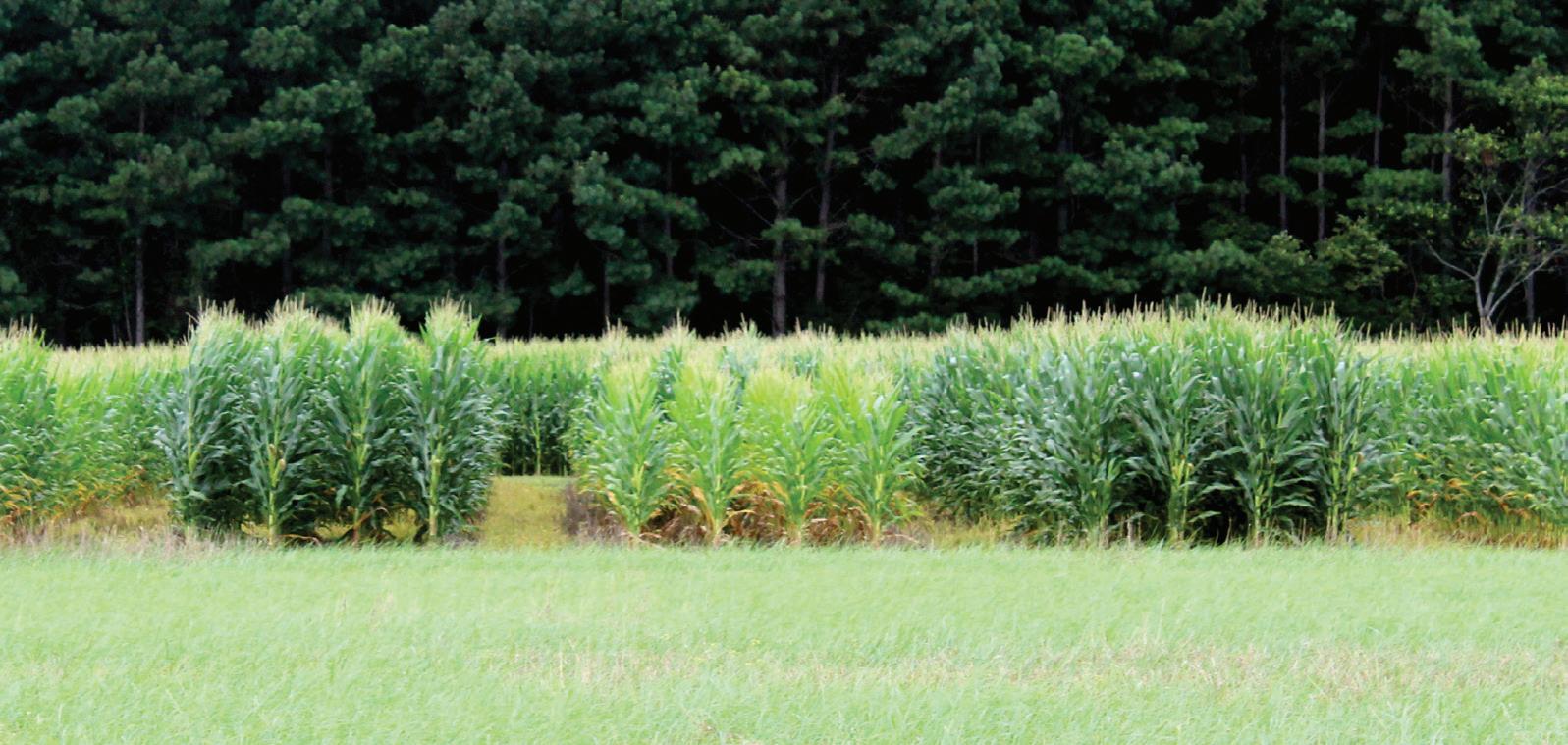
> Plans to apply nutrients in the right amount, at the right time and in the right location
> Options for various levels of nitrogen and phosphorus management and manure injection
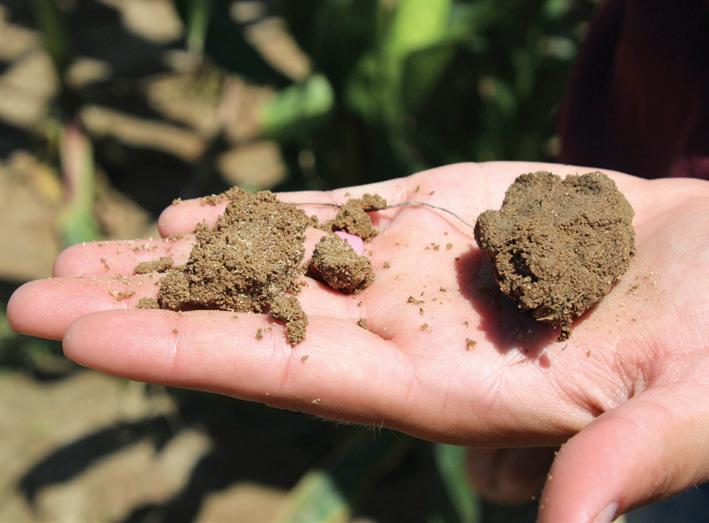
Prescribed grazing/ grazing land management
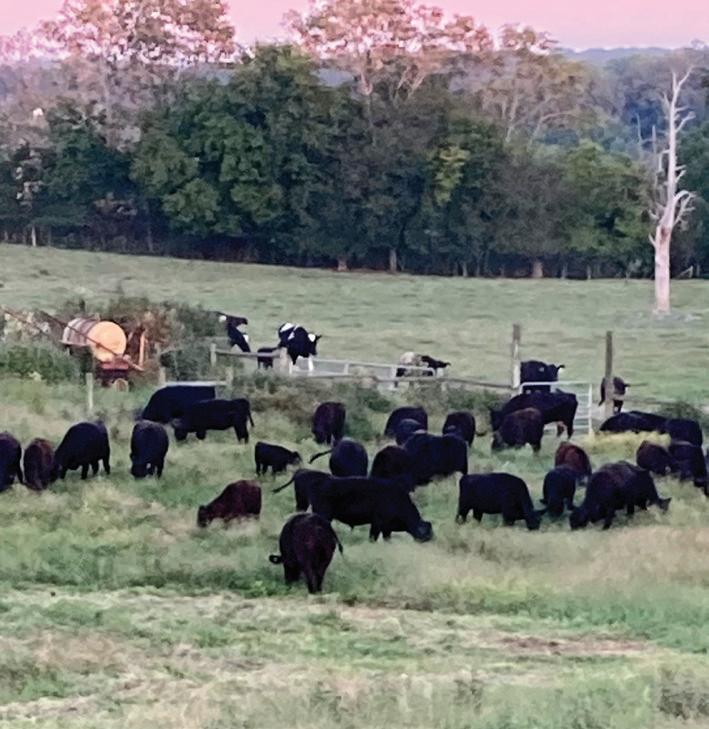
> Rotational grazing systems
Animal waste practices
> Manure storage, mortality composting facilities and poultry litter transport
Conservation initiative practices
> Maintenance of BMPs not currently in lifespan with conservation programs
Forestry and land cover practices
> Riparian and upland tree planting; long-term cover on cropland
18 VIRGINIA FARM BUREAU NEWS
‘On your own terms’
Levels of nitrogen uptake are evident in the gradients of green in corn plots grown with various combinations of best management practices on the Eastern Shore.
Take CARE
BY CHRISTINA AMANO
Stress is inevitable when feeding a hungry world, but beginning and firstgeneration farmers experience an alarming amount of stress as compared with their more-experienced counterparts.
Georgia’s Mercer University conducted a survey that found extraordinary levels of farm stress among first-generation farmers.
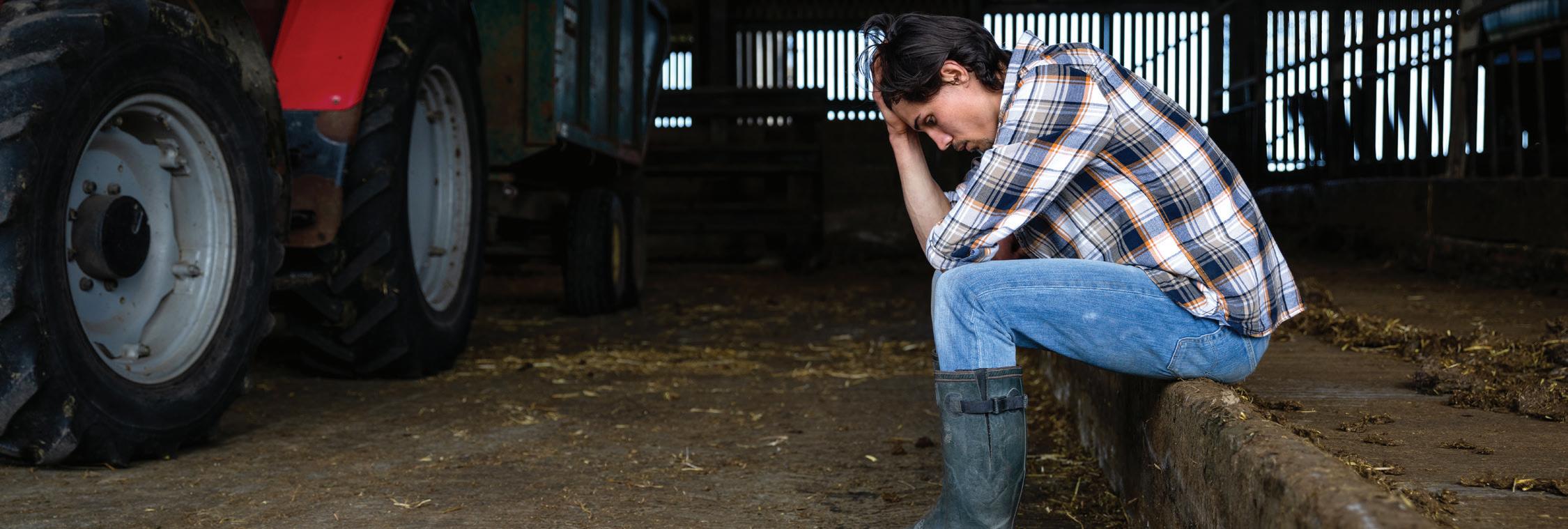
The results indicated that firstgeneration farmers often lack the “social and cultural capital needed to weather the storm (of farming),” said Dr. Kim Niewolny, director of the Virginia Beginning Farmer and Rancher Coalition and Virginia AgrAbility Program.
Many beginning farmers face significant barriers like land access issues and rising start-up costs, and first-generation farmers often lack the necessary contacts and possibility of generational land transfers.
“Programs like ours exist for that reason,” Niewolny noted.
VBFRC helps beginning farmers and ranchers establish and sustain viable agricultural operations by providing resources. The Farm Safety, Health and Wellness Initiative offers a farm stress and mental health toolkit of webinars, case studies, trainings, and farm dinner theaters during which agriculturalists share their
experiences through performances.
“Try to be as active as possible in the industry, and you’ll meet a lot of people who want to help you along the way—it’s impossible to do it alone,” said Adam Davis, who found success as a beginning farmer by building a support network and finding a mentor in the community.
AgrAbility Virginia promotes safety, wellness and accessibility on the farm through education, rehabilitative services and assistive technology. The program aims to emphasize mental health as an important element of the agricultural world.
“Mental health is no different than physical health,” Niewolny said. “If you are feeling anxiety to the point where you are suffering and at risk of unsafe decisions on the farm, it’s important to take a deep breath and reach out to get the support you need.”
With many uncontrollable stressors like rising production costs, livestock uncertainties and volatile markets, Niewolny emphasized the importance of “building the practice of taking care of yourself daily, taking time away from the farm when possible, and talking to family and friends when feeling stressed and anxious.”
Registered nurse Linda Emanual said, “You need to be okay with saying, ‘At the end of the day, I did the best that I can.’” She also serves
as community health director of the AgriSafe Network, which offers the AgriStress Helpline for farmers to speak directly with a crisis specialist versed in agricultural knowledge.
Talking to a close friend or behavioral health specialist, selfreflection, meditation, exercise, eating healthy and getting adequate sleep all can help alleviate chronic stress symptoms like lashing out or withdrawing from loved ones.
“The most important thing to remember is that you’re not alone,” Niewolny said. “You have a community of people who want to help you.”
Emanuel said the next generation of agriculturalists have “tremendous value and worth—feeding a hungry world, providing the food, fuel and fiber for us to live full, productive lives. We need you to sustain a healthy life.”
The AgriStress Helpline is available 24 hours a day, 7 days a week, and has interpretation services for 160 languages. Call or text 833-897-2474 to receive direct emotional support, advice and resources from a trained professional. Visit the AgriSafe website at agrisafe.org for additional resources.
To access VBFRC’s suite of resources, visit vabeginningfarmer.org or the AgrAbility Virginia website at agrabilityvirginia.org
vafb.com / SEPTEMBER 2023 19
DOLAN
Next-generation farmers can learn to ‘weather the storm’
Restoring a robust rural economy
ARTICLE AND PHOTOS BY NICOLE ZEMA
Farmers know if they don’t have a seat at the table, their interests won’t be on the menu.
As the 118th Congress shapes the 2023 Farm Bill, Virginia Farm Bureau Federation farmers took time to explain their priorities to lawmakers.
The farm bill expires every five years, updated through a process in which items are proposed, debated and passed by Congress.
Due to elections and retirements, almost half of Congress—260 new members—will address the spending package for the first time. This presents both opportunities and challenges.
“It could get dragged down in the mud if we’re not careful,” said VFBF Vice President Scott Sink. “We met with representatives to make sure they understand the nuances.”
VFBF has joined a national campaign called “Farm Bill for America’s Families: Sustaining Our Future.” Spearheaded by American Farm Bureau Federation, the campaign highlights the necessity of the farm bill’s reauthorization.
AFBF reports this could be the first $1 trillion package in history.
Farm bill programs ensure the survival of the food and agriculture industry, which supports 46 million jobs and contributes more than $1 trillion to the U.S. gross domestic product.
The bill typically includes 12 titles, from commodities to crop insurance and nutrition. Without reauthorization, certain commodity support programs could end or revert to previous, outdated frameworks.
Farm bill summits create connections
Farmers had multiple chances to meet with congressional representatives at regional roundtables to discuss the policies that directly impact their operations.
A July roundtable was held at Maple Springs Farm in Augusta County with Rep. Ben Cline, R-6th, and U.S. Rep. Glenn “GT” Thompson, a Republican from Pennsylvania and chair of the House Committee on Agriculture. A writer of the farm bill, Thompson shared his perspective.
“Our goal is we do this in a bipartisan way, on time and highly effectively,” he
said. “The overall vision is to restore a robust rural economy. The 2023 Farm Bill will be your farm bill—one that reflects the priorities of the American farmer, forester and processor. And our biggest challenge is the clock.”
At The Meadow Event Park in Caroline County in April, U.S. Rep. Abigail Spanberger, D-7th, listened to farmers and pledged to address their concerns as the only Virginian serving on the House Committee on Agriculture.
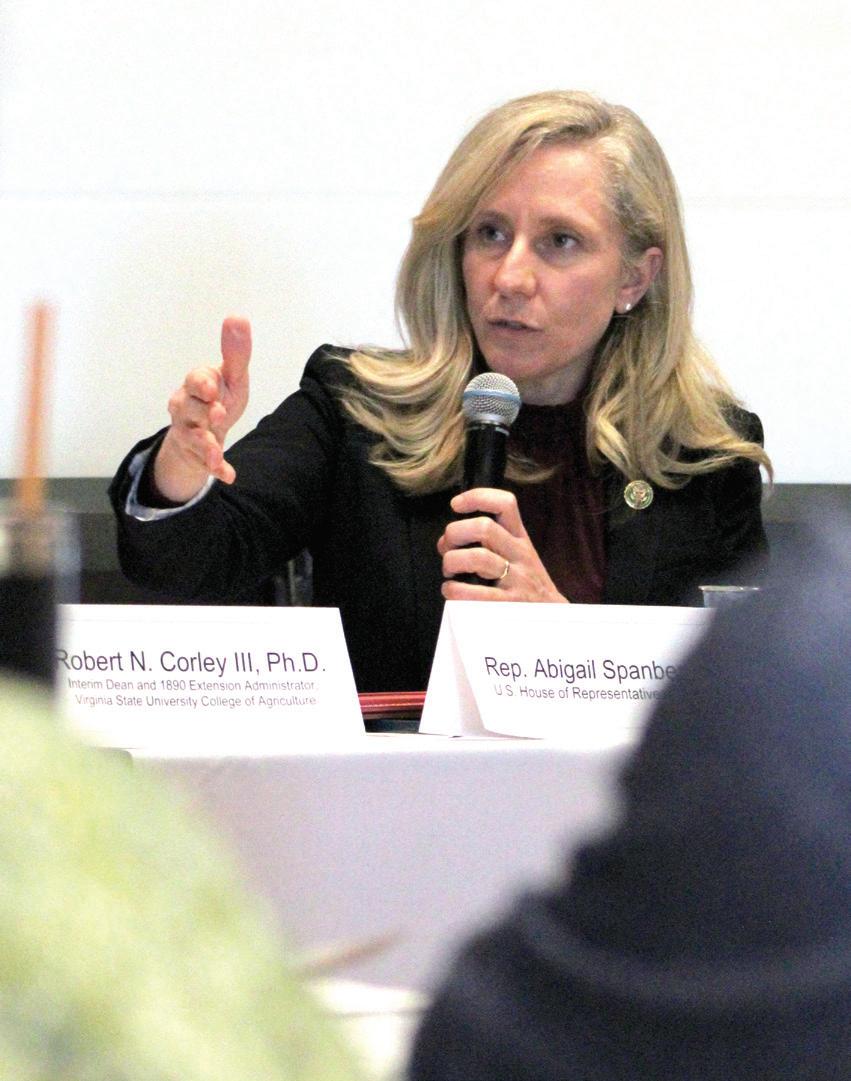
“It’s our priority to get the farm bill done in 2023,” Spanberger said. As challenges to the farm bill emerge, “I want to know how we can best support our farm families, ag businesses, infrastructure, ag workers and economy.”
Cattle and crop farmer Mack Smith, Rockbridge County Farm Bureau president, visited Washington, D.C., to talk with congressional representatives from both rural and urban districts as part of the AFBF Advocacy Fly-In in June.
“We need to be making these connections with urban legislators,” Smith said. “Though our worlds are not the same, they care about food
20 VIRGINIA FARM BUREAU NEWS
Virginia farmers make priorities known as first $1 trillion farm bill is drafted
production and stability, and want to know what they can do to help.”
Dairy and beginning farmers seek opportunity
Conservation program funding, agricultural labor, loan limits and livestock issues were among topics presented by farmers, plus farmland access and the Dairy Margin Coverage program.
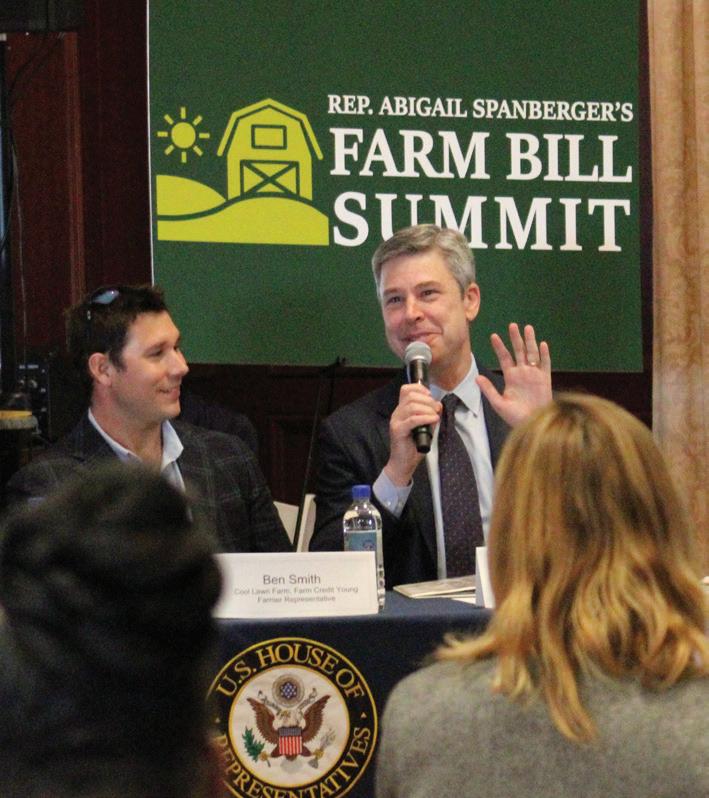
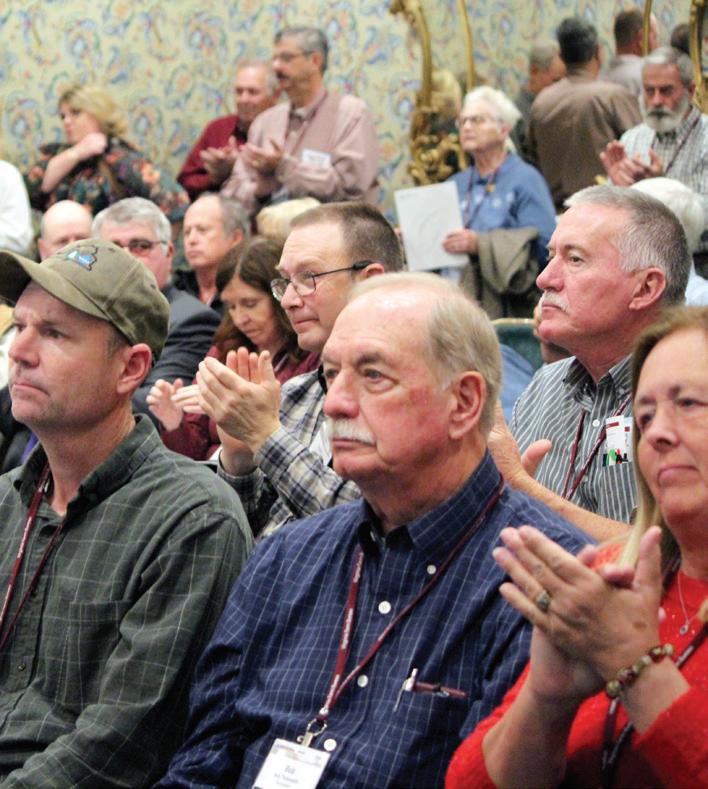
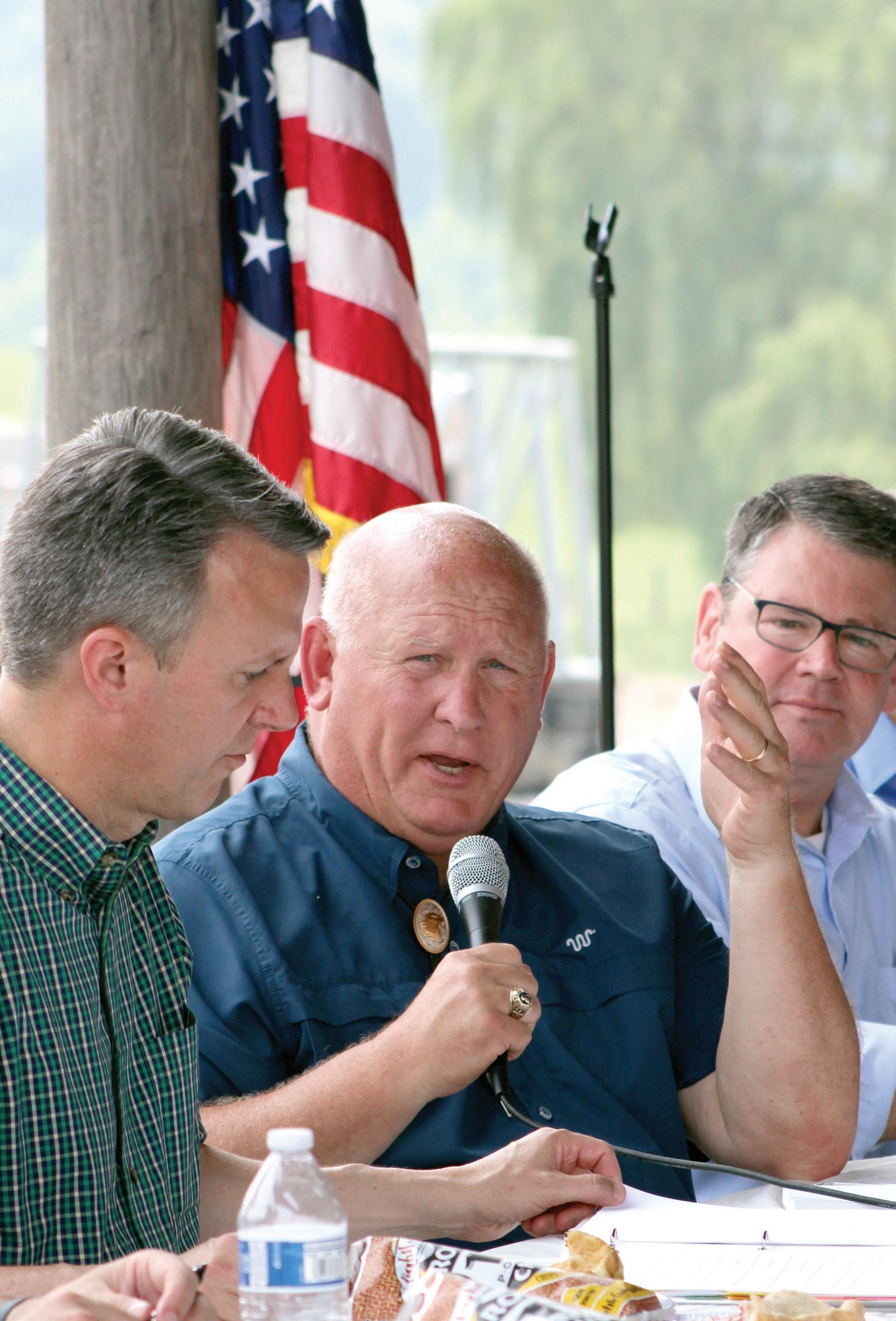
The 2018 Farm Bill included an investment of $485 million for beginning, socially disadvantaged and veteran farmer programs. Aspiring farmers are hopeful for more.
“We need more programs coming out of the farm bill to help with land access, farmland preservation and competition with development and solar facilities,” said Rachel Henley of the Goochland County Farm Bureau Young Farmers Committee.
Virginia’s dairy farmers also weighed in on their priorities, like modernizing Dairy Margin Coverage. Enacted in the 2018 Farm Bill, the DMC program has been successful, though coverage is based on outdated production records.
“The prices for milk right now are pretty dire, and our margins are not where they should be,” said Rockingham County dairyman Kevin Craun. “All we’re looking for is a safety net. We don’t want our income from the government. No farmer does.”
vafb.com / SEPTEMBER 2023 21
Above, a farm bill roundtable was held at Maple Springs Farm in Augusta County in July. Pictured, from left: Rep. Ben Cline, R-6th; and U.S. Rep. Glenn “GT” Thompson, a Republican from Pennsylvania and chair of the House Committee on Agriculture; with Virginia Secretary of Agriculture and Forestry Matt Lohr. At left, farmers packed into a farm bill workshop at the 2022 Virginia Farm Bureau Annual Convention. Andrew Berke, administrator of the U.S. Department of Agriculture’s Rural Utilities Service, is pictured at the roundtable with Ben Smith of Cool Lawn Farm in Fauquier County. Opposite page, U.S. Rep. Abigail Spanberger, D-7th, the only Virginian serving on the House Committee on Agriculture, held a roundtable with Virginia agriculturalists at The Meadow Event Park in April.

Chesapeake grains grower named Virginia Farmer of the Year
BY ALICE KEMP
Determined and driven are words that aptly describe Heath Cutrell.
Those qualities have led the fourthgeneration farmer from humble beginnings on his family’s land to running his own 5,000-acre operation, which spans three localities and two states.
They’re also what led to him being named the 2023 Sunbelt Ag Expo’s Virginia Farmer of the Year. The award recognizes producers who embody excellence in agricultural production and farm management alongside leadership in farm and community organizations.
“It’s above anything I’ve ever done,” Cutrell said. “I love a good challenge and a good competition, but to have people nominate me for this means more than I can ever explain.”
Cutrell’s love for farming stemmed from the time he was a toddler playing with toy tractors. He worked alongside his father and uncle on their 1,200-acre farm raising grain crops before branching out on his own after high school.
“There was really no room for growth” on the family farm, Cutrell reflected. “So, I went to some other farmers in the area and learned what
to do and what not to do. That inspired me to make the right moves.”
He worked on nearby farms and hauled demolition material until he received an opportunity to lease a 170-acre farm. The Cutrell Farms proprietor quickly made a name for himself as a conscientious farmer and good steward of the land. He won a Clean Water Farm Award from the Virginia Dare Soil and Water Conservation District for utilizing best management practices.
Cutrell’s reputation and business acumen brought more opportunities to expand. After his father retired, he took over the family business and now has two full-time employees helping him raise corn, wheat and soybeans in southeastern Virginia and northeastern North Carolina.
By using precise planting methods and following specific fertilizer and nutrient management plans, Cutrell has achieved record-breaking yields, all while contending with the Tidewater’s sometimes turbulent weather. He’s a six-time winner in the National Corn Growers Association’s National Corn Yield Contest—most recently in 2022 with 394 bushels per acre for conventional, non-irrigated corn. That top-producer prominence earned him a spot on the show
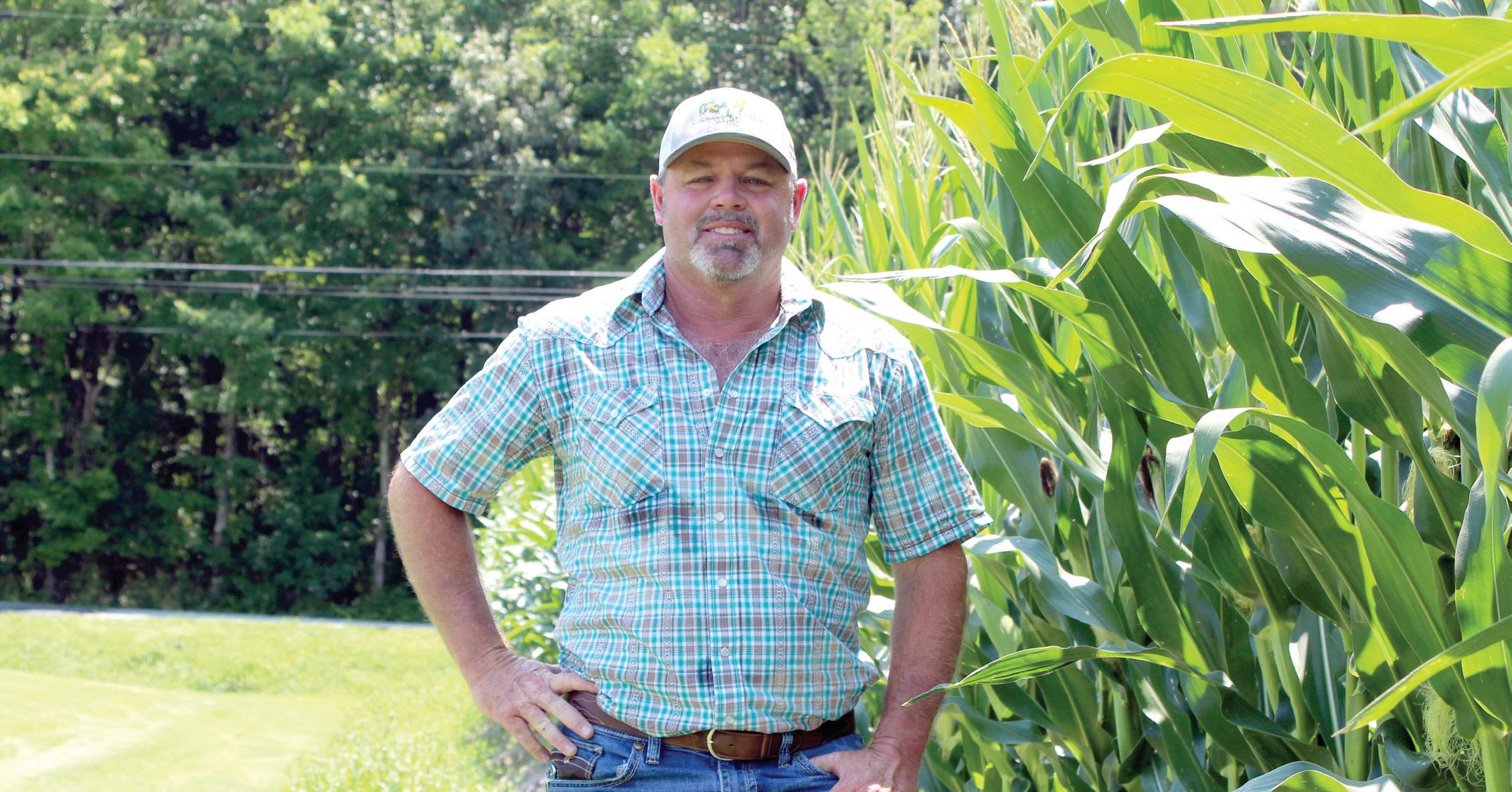
Corn Warriors
.
The two Virginia Cooperative Extension agents who nominated him for the award—Roy Flanagan in Virginia Beach and Nathan Sedghi in Chesapeake— called Cutrell’s accomplishments “very unique in southeastern Virginia. Heath’s ability to start a brand-new farming operation and grow it to the size it is today, along with his drive to push the boundaries on his yields, are why we nominated him.”
When he’s not farming, Cutrell is involved in the community. He’s a long-time supporter of the Chesapeake and Virginia Beach 4-H Livestock Clubs’ Show and Sale, and shares his knowledge with beginning and young farmers. He also previously served on the Chesapeake Farm Service Agency board and the Chesapeake Farm Bureau board of directors.
“I enjoy helping kids any way I can,” he said. “When I was younger, farmers did the same for me, and that’s why I give back the way I do.”
As the Sunbelt Ag Expo’s Virginia Farmer of the Year, Cutrell will compete against nine other state finalists for the overall regional title. The winner will be announced in October during the Sunbelt Expo in Moultrie, Georgia.
vafb.com / SEPTEMBER 2023 23
ALICE KEMP
Ask the experts: Reasons to contact your insurance agent
BY ALICE KEMP
Life is filled with changes, big and small—a new baby, a remodeled home, or a paid-off car. With everything happening amid the hustle and bustle of daily life, thinking about your insurance needs may seem like a low priority.
But it’s smart to check in with your insurance agent occasionally, as even small changes can impact your coverage.
A simple conversation can be the difference between paying more and saving money, or not having
your family or your assets properly protected.
There are several reasons to call your insurance agent, and we asked a few Virginia Farm Bureau Mutual Insurance Co. agency managers to share when clients should reach out.
“Whenever there’s something new—a new car, new home, new land purchase, newborn, or newly married. You may need additional coverage, and agents can review your coverage to make sure holes and gaps in your insurance program are filled.” – Kevin
Wiseman, Floyd County
“If you’ve had a change in your finances, call your insurance agent to help review your specific financial situation. They can make sure your family is protected in the event of an untimely death as well as help with estate and retirement planning.” – Rhodes
Martin, Lunenburg County
“If you buy or sell farm equipment, build or update a building, substantially increase or decrease your livestock or hay inventory, or you’re considering different farm ventures, your Farm Bureau agent can ensure your farm insurance policy is up-to-date, and that you have the right endorsements.” – Wade Stimpson, Cumberland County

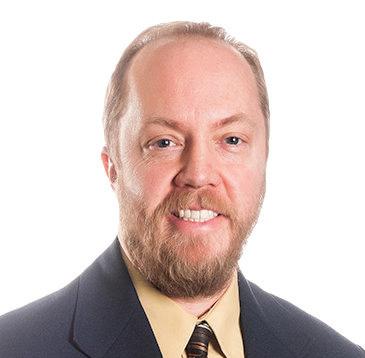
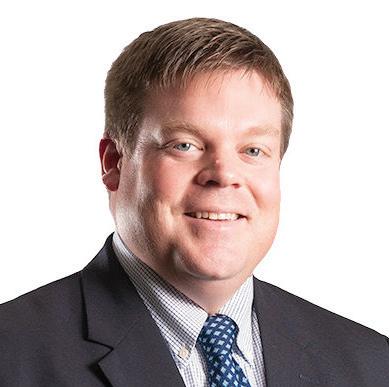
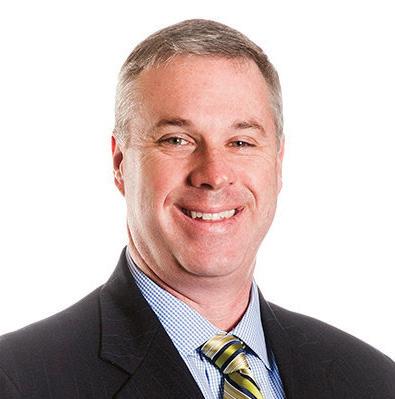
“If you have a job change, we may need to reevaluate your auto usage and homeowner endorsements. Any time you inherit any property or assets, we need to review options to get the right coverage limits in force.” – Courtney
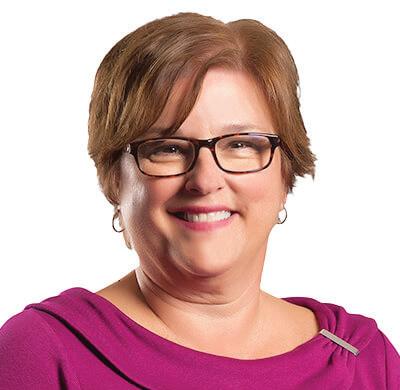
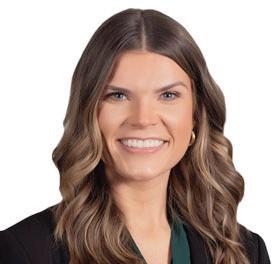 Kelley, King George County
Kelley, King George County
“When you have questions about pricing, call us. We can discuss your policy and see if we can work out a solution for you. We have the availability to shop for other coverages through our brokerage companies while keeping clients in-house and keeping them VFB members.”
– Randal Perkins, Alleghany County
“Call when you have a child that has gone off to college to see what coverage they have and if additional coverage is needed. It’s important to have the right insurance so they’re protected while away at school.” – Laura
“K-K” King, Westmoreland County
Virginia Farm Bureau Ambassador application deadline is Dec. 31
Young adults interested in serving as ambassadors for agriculture and Virginia Farm Bureau can apply for the Virginia Farm Bureau Ambassador program.
The purpose of the program is to recognize a young agriculturist for their interest and achievements in agriculture and provide them
with an opportunity to serve as an ambassador for agriculture and Farm Bureau. Each contestant is expected to develop, present and defend an agriculture-related activity platform or project they will execute during their tenure.
The winner and runners-up are eligible for cash awards and will be
announced at the annual Virginia Farm Bureau Federation Women’s Leadership Conference in April 2024.
Eligible applicants between the ages of 18 and 24 can review the rules and essay guidelines and apply online at vafb.formstack.com/forms/ farm_bureau_ambassador
24 VIRGINIA FARM BUREAU NEWS
BY NICOLE ZEMA
Robert Moyer was miles from home when his alternator went kaput in January.
“I was in North Carolina visiting my son,” said the Prince William County resident. “We’d jump it, but it would only stay started for a couple minutes.”
Since the family’s Virginia Farm Bureau Mutual Insurance Co. auto policy includes towing and labor coverage, he was automatically covered for roadside assistance, even out of state. Moyer made the call, and within an hour a tow truck took the car to a nearby service shop.
He’d called the 800 number in the past—like the time his SUV’s cooling system blew a gasket while returning from Myrtle Beach, or when his
daughter’s car was disabled at her apartment.
“No hassles,” he recalled. “I was satisfied with how it all worked out.”
VFBMIC auto insurance policyholders who opt for towing and labor coverage will automatically receive Roadside Assistance, powered by Quest®. Towing and labor coverage reimburses expenses incurred for automobile disablements such as towing, tire changes, jump-starts, lockouts, fuel deliveries and extractions.
The extra coverage also comes with peace of mind, said Barry Light, VFBMIC senior product development manager.
“They will bring the help to you wherever you are with no
out-of-pocket costs to you, as long as the expense is within the limit on your covered vehicle,” he explained. Customers can simply call the Farm Bureau claims number on their auto ID card and select “Roadside Assistance” to be directed to VFBMIC’s roadside partner. Help is coordinated as a courtesy for the member, and costs are covered up to applicable limits.
If you do not have this coverage on your vehicles, or would like to select a higher benefit limit, call 888-236-7716, visit vafb.com/roadside or contact your county Farm Bureau office.
For 24/7 Roadside Assistance, call 800-452-7714.
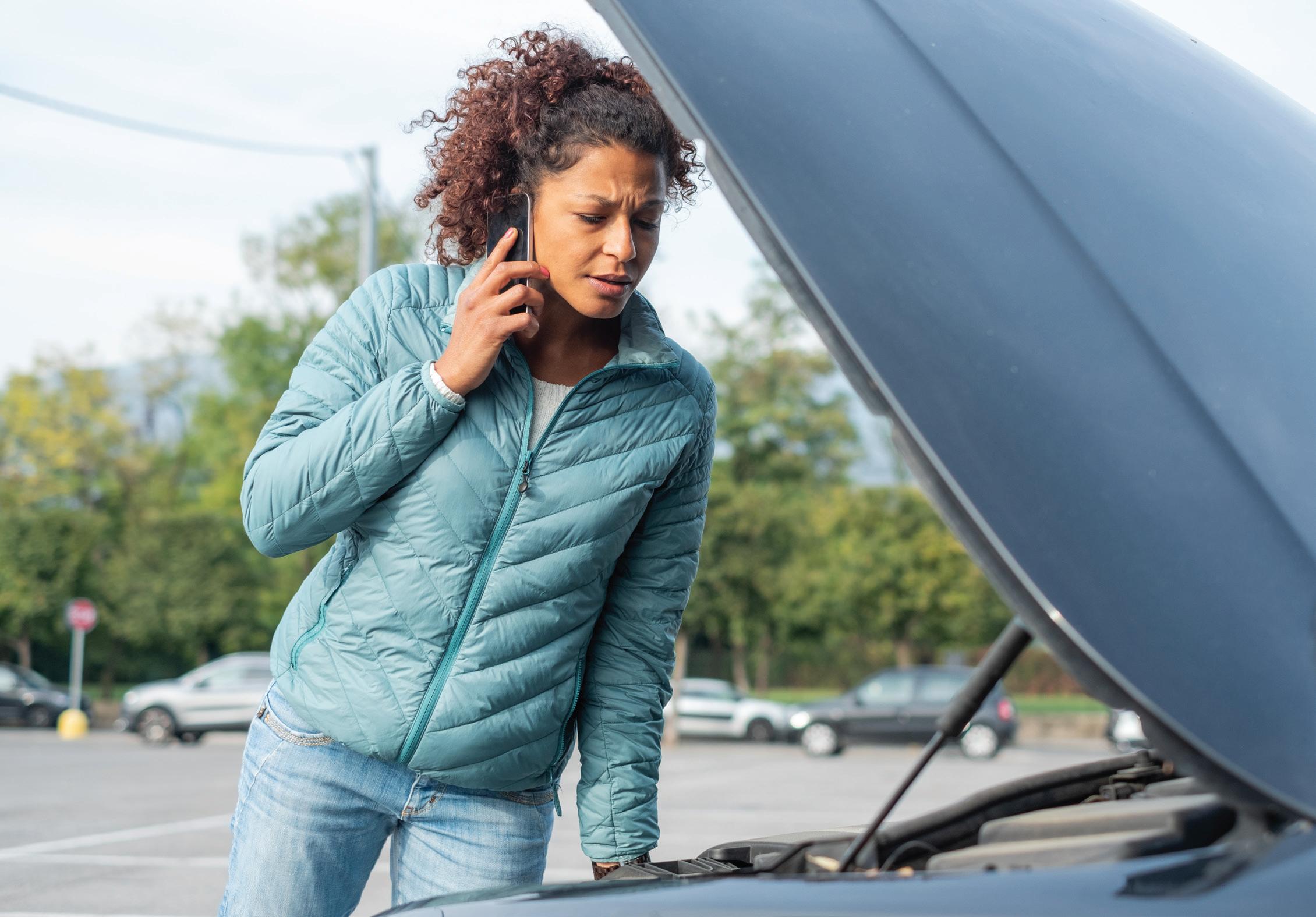
vafb.com / SEPTEMBER 2023 25
‘Wherever you are’ Roadside assistance included with towing and labor coverage
Stay on top of Medicare enrollment periods using VFB advisers
BY CHRISTINA AMANO DOLAN
Medicare enrollment can be confusing, especially with a mixed bag of information online. However, Farm Bureau advisers are always ready to help, so don’t wait until the last minute to comb through your options.

“It’s never too early to start researching,” said Tracy Cornatzer, director of sales for VAFB Health Insurance Solutions.
While the first opportunity to sign up for Medicare generally occurs three months prior to an individual’s 65th birthday, Cornatzer encourages exploring options with a trusted adviser at age 64 or earlier.
The Initial Enrollment Period lasts seven months, beginning three months prior to an individual’s 65th birth month and concluding three months after. Individuals can sign up for Original Medicare Part A and Part B coverage, which starts on the first of the month following enrollment. Enrollment is automatic for those who are already receiving Social Security or Railroad Retirement Board benefits.
The Annual Election Period runs Oct. 15 through Dec. 7, and is when Medicare beneficiaries can purchase or change their Medicare Advantage plans or Part D prescription drug coverage for the upcoming year. New coverage choices go into effect Jan. 1.
The General Enrollment Period occurs Jan. 1 through March 31 for those who didn’t sign up for Medicare Part A or Part B coverage during their Initial Enrollment Period and are
not eligible for special enrollment. Coverage goes into effect the first day of the month after signing up. For those who sign up late for Medicare, there’s a 10% lifetime penalty for each 12 months an individual was eligible but didn’t enroll.
The Special Enrollment Period allows qualifying individuals to enroll in a Medicare Advantage plan after their Initial Enrollment Period. Qualifying events include a loss of employer group coverage upon retirement, moving out of a plan’s service area, entering a nursing home or facility, or meeting low-income requirements.
Fortunately, Farm Bureau agents can help individuals conduct needs assessments each year and identify plan options that best fit.
To learn more, call your county Farm Bureau office or 800-229-7779.
26 VIRGINIA FARM BUREAU NEWS
Last call for ag innovation challenge entries
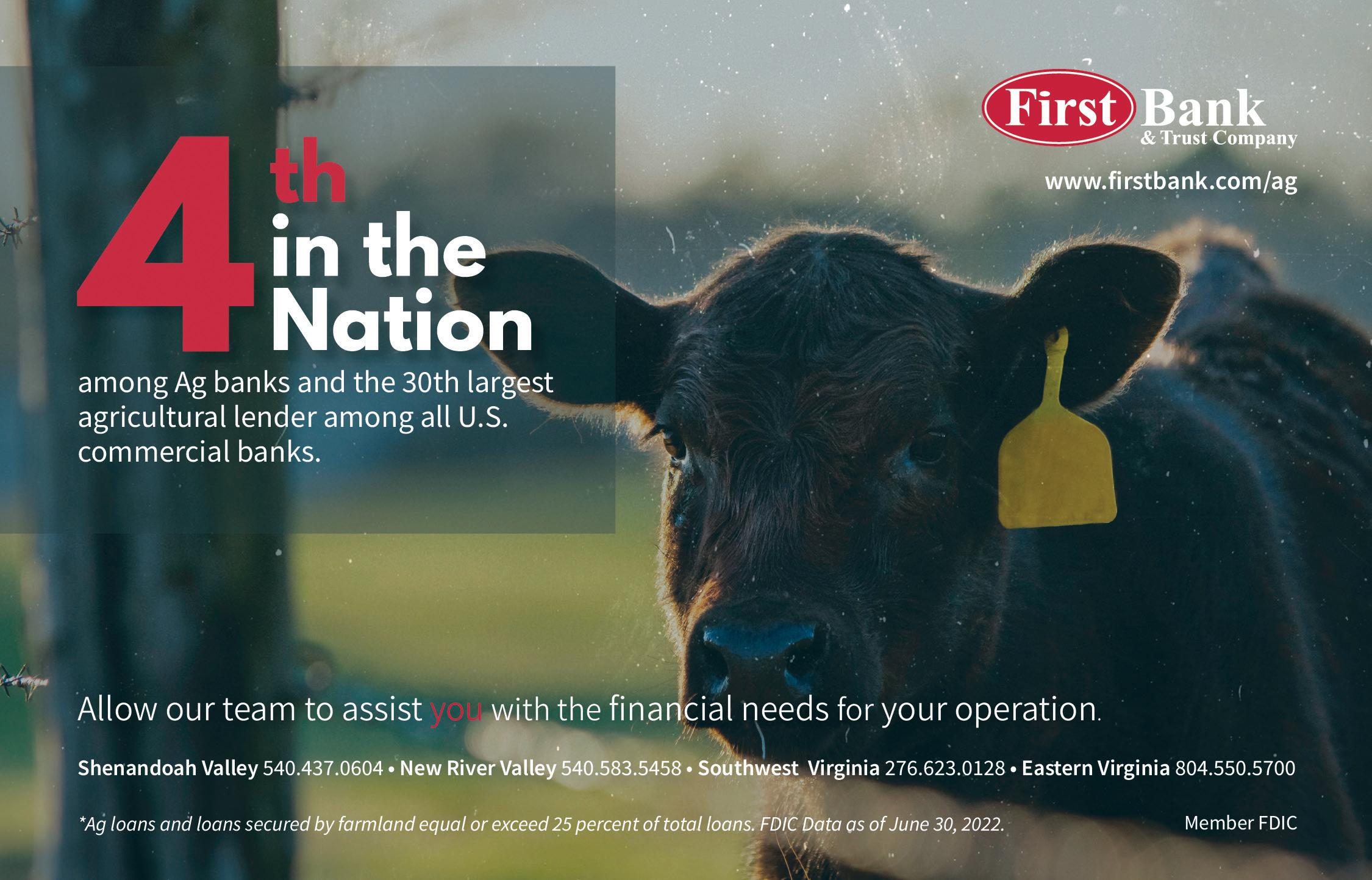
Farmers and rural entrepreneurs have until Sept. 15 to apply for the second annual Agricultural and Innovation Challenge and vie for a total of $30,000 in prize money.
The 2023 competition, sponsored by the Virginia Foundation for Agriculture, Innovation and Rural Sustainability, offers businesses the chance to showcase ideas or products that could benefit Virginia’s agriculture and forestry sectors.
Also known as the “Bull Pen,” the competition provides a platform to help contestants develop and promote their enterprise proposals, expose their proposals to professional review and critique, and compete for cash prizes.
Up to five finalists will receive $2,500 each, a runner-up will receive $5,000 and the contest winner will take home $10,000. A People’s Choice Award winner will receive $2,500. VA FAIRS will select up to five finalists to compete Nov. 27 and 28 at the Virginia Beach Convention Center during the 2023 VFBF Annual Convention, where the winners will be announced.
To enter, applicants must register for a free Jotform.com account, visit vafairs.com/bullpen and click the 2023 Bull Pen Application button to submit an application package.
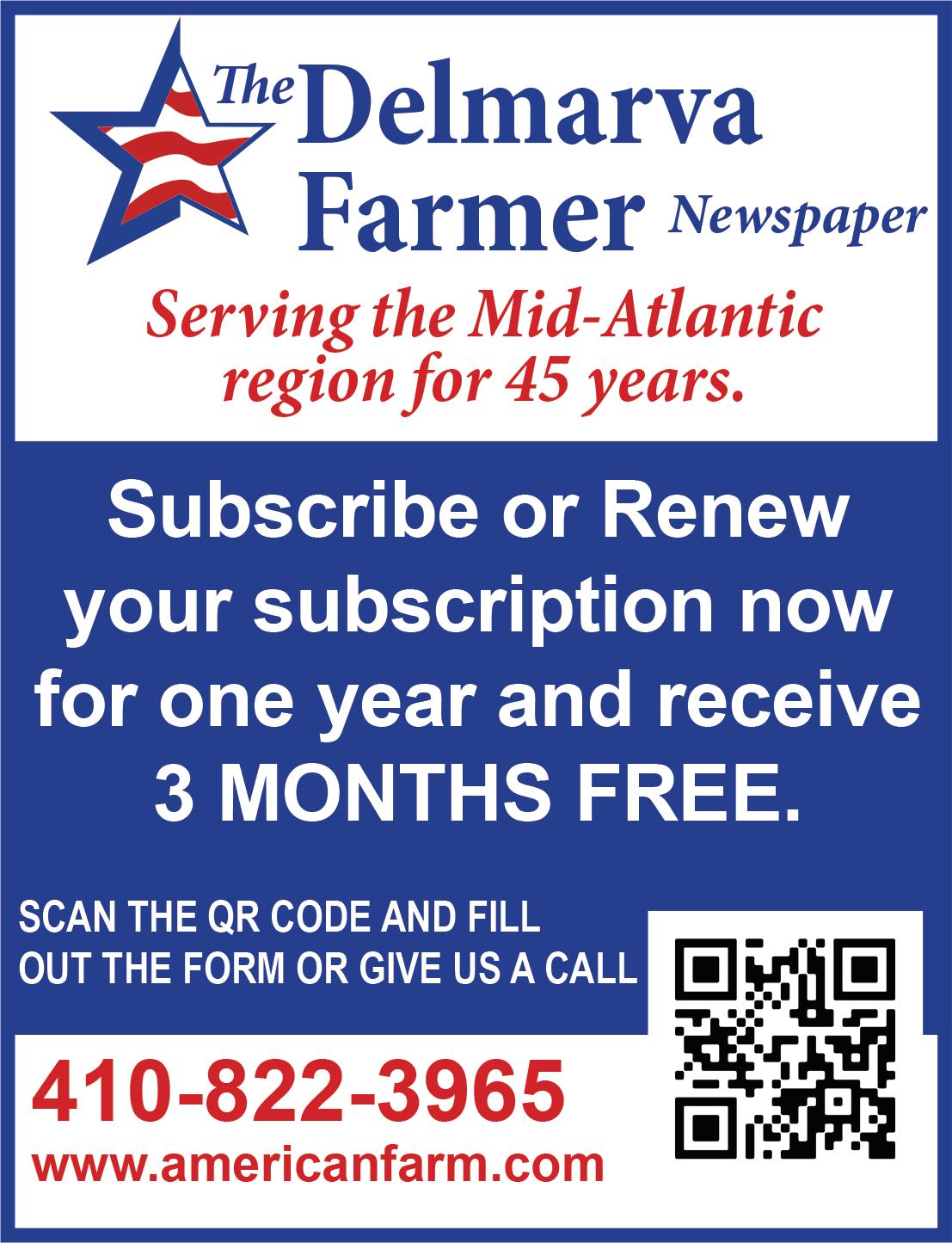
vafb.com / SEPTEMBER 2023 27
Sweet, honeysavory chicken

Celebrate chicken and honey months with these delectable pairings
What do you do when two great food holidays fall in the same month? Celebrate them both, of course!
September is National Chicken Month and National Honey Month, so why not mark the occasion by cooking some delicious honey chicken dishes?
Honey and chicken make a delightful pairing. Whether in a marinade, dressing or sauce, honey is a versatile ingredient that provides a natural sweetness to enhance flavors and compliment chicken. It works well in herby dishes, spicy dishes and paired with other condiments, like mustard.


Honey’s rich flavor profile can vary based on honeybees’ nectar source, and the wide range of honeys produced in Virginia—like clover, thistle, tulip poplar and sourwood—are a credit to the commonwealth’s floral diversity.




Broiler chickens are Virginia’s No. 1 commodity, garnering over $950 million in cash receipts. And while the state’s honey sector isn’t quite as robust, Virginia apiarists produced a hefty 266,000 pounds of honey in 2022, totaling over $2 million in sales.



28 VIRGINIA FARM BUREAU NEWS Heart of the Home
PHOTO COURTESY OF THE NATIONAL HONEY BOARD
Jalapeno and honey provide a sweet and tangy combination to dress this savory spinach and chicken salad.
Grilled Chicken Salad with HoneyJalapeno Vinaigrette
Ingredients
honey-jalapeno vinaigrette, divided (recipe below)
6 boneless, skinless chicken breasts
9 cups lightly packed baby spinach
1½ cups shredded Monterey Jack cheese
3 slices thick bacon, crisply cooked and crumbled
3 small tomatoes, each sliced lengthwise into 4 wedges
For the vinaigrette
3 tablespoons white wine vinegar
3 tablespoons fresh lime juice
2 tablespoons coarsely chopped fresh cilantro
1 tablespoon seeded and coarsely chopped jalapeno pepper
2 large cloves garlic, quartered
1 teaspoon salt
½ teaspoon freshly ground black pepper
⅔ cup honey
⅔ cup vegetable oil
Directions
For the vinaigrette: In a blender or food processor, combine vinegar, lime juice, cilantro, jalapeno, garlic, salt and pepper. With the blender running, add the honey, then the oil, and mix well. Refrigerate until needed.
For the main dish: Place chicken in a large resealable plastic bag and add ¾ cup honey-jalapeno vinaigrette. Seal the bag, and refrigerate for 30 minutes or overnight. Drain and discard the marinade.
Grill the chicken, covered, over medium heat for 6-7 minutes on each side or until it reaches an internal temperature of 165˚. Cut chicken across the grain into ½” wide strips.
Put 1½ cups of spinach on each of six serving plates. Drizzle the spinach with
1 tablespoon of the vinaigrette. Top each with chicken strips, ¼ cup cheese and crumbled bacon, then garnish with two tomato wedges and drizzle 1 tablespoon of vinaigrette on top.
—Recipe adapted from the National Honey Board
Slow-Cooked Honey Sesame Chicken with Quinoa
Ingredients
1½ pounds skinless chicken thighs
⅓ cup honey
¼ cup ketchup, or tomato sauce with a splash of vinegar
¼ cup low-sodium soy sauce
1½ tablespoon canola oil
½ teaspoon ground pepper
½ cup diced sweet onion
1 cup sliced mushrooms
2 cloves garlic, minced and smashed
2 carrots, shredded
1 stalk celery, thinly sliced
1 cup quinoa
1¼ cups water
Toppings
½ tablespoon toasted sesame seeds
3 scallions, thinly sliced
Directions
Place chicken into the bottom of a slow cooker.
In a medium bowl, combine honey, ketchup, soy sauce, oil and ground pepper. Whisk ingredients together, then set aside. In another medium bowl, combine the
onion, mushrooms, garlic, carrots and celery, then add in the honey sauce. Toss until all vegetables are coated, then pour everything over the chicken. Secure the lid on the slow cooker, set heat on low, and cook for 6 hours.
About 20 minutes before the chicken is completely cooked, prepare the quinoa by first placing it in a fine mesh strainer. Rinse the quinoa with water, then transfer it to a pot. Cook the quinoa over medium heat until aromatic and you hear the seeds begin to “pop.” Add water, cover the pot, turn the heat to low, and steam for 15-18 minutes. Once cooked, fluff with a fork, and set aside.
When the chicken is cooked, shred it using two forks.
Serve the chicken and vegetables over steamed quinoa. Drizzle a tablespoon of cooked honey sauce over the chicken and quinoa.
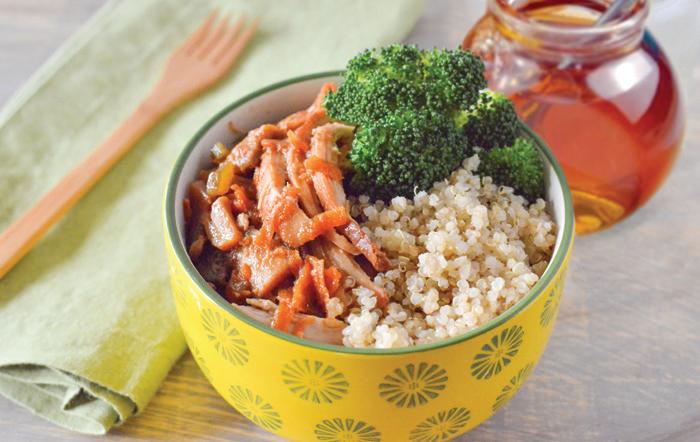
—Recipe courtesy of the National Honey Board
Honey Baked Chicken
Ingredients
3-pound chicken, cut into pieces ⅓ cup butter or margarine, melted ⅓ cup honey
2 tablespoons prepared mustard
1 teaspoon salt
1 teaspoon curry powder
Directions
Heat oven to 375°.
In a lightly oiled, shallow baking pan, arrange chicken skin-side-down. In a bowl, combine the remaining ingredients, and spoon the mixture over the chicken. Bake for 45 minutes, basting every 15 minutes, until the chicken is golden brown and it reaches an internal temperature of 165˚.
—Recipe adapted from Country Treasures from Virginia Farm Bureau Kitchens
vafb.com / SEPTEMBER 2023 29
Agriculture Literacy Week connects over 70,000 students with agriculture
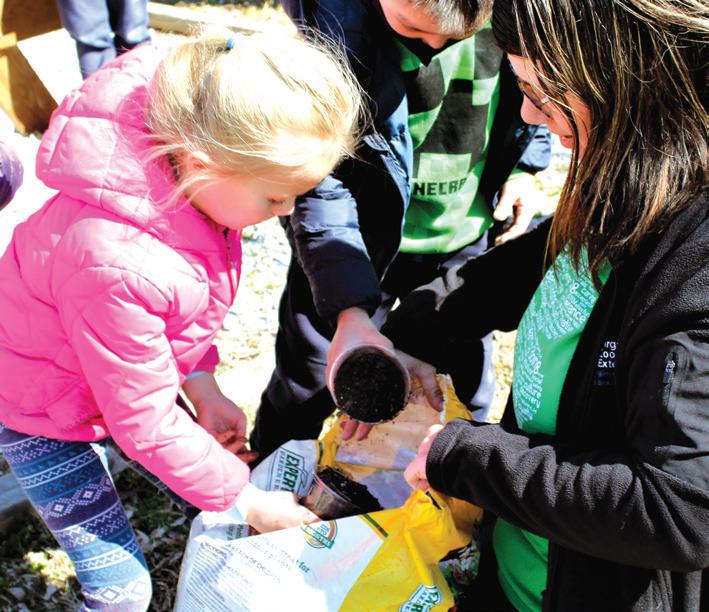
 ARTICLE AND PHOTOS BY ALICE KEMP
ARTICLE AND PHOTOS BY ALICE KEMP
Thousands of Virginia students are a little more knowledgeable about where their food comes from thanks to farmers and friends of agriculture.
More than 1,000 volunteers read to over 70,000 students during Virginia Agriculture in the Classroom’s annual Agriculture Literacy Week, March 13-17. Participants in the event read AITC’s 2023 Book of the Year, I Love Strawberries! by Shannon Anderson.

The book follows strawberry-loving Jolie as she grows her own fruit from seedling to table with help from her rabbit sidekick, Munchy. The humorous book—colorfully illustrated by Jaclyn Sinquett—gives readers a peek into everything involved as the delicious berry is cultivated.
More than 2,900 books were donated to public and private school classrooms across the state, as well as to community clubs and local libraries, said Tammy Maxey, AITC executive director.
“It’s inspiring to see the farming community join forces to provide children with agriculture’s story in 2023,” Maxey said. “Children had an opportunity to meet a farmer or community leader to learn about agriculture and its value to everyday life.”
Many of the readings were accompanied by hands-on activities. Carter Humphries, a Virginia Cooperative Extension agent in Henrico County, read to students at several county schools with help from local FFA students. After the readings, some classes planted their own herbs while others learned how to extract strawberry DNA.
“They thought it was the coolest thing ever!” Humphries exclaimed. “As a mainly suburban area, many of our youth aren’t exposed to agriculture, so this project is just one small way we can connect agriculture to the life skills and science standards students are learning in the classroom.”
Agriculture Literacy Week is AITC’s largest educational event. It provides a fun, engaging way to increase children’s knowledge of farming and where their food comes from—and the importance of agriculture.
“It amazed me that the youth, even the older ones, didn’t know what the term ‘agriculture’ meant,” Humphries added. “Even though we’re only with them for a short amount of time, we hope the lesson sparks some ideas, discussion and interest to learn more.”
Volunteer readers also included
Virginia’s first lady, Suzanne Youngkin; Virginia Secretary of Agriculture and Forestry Matthew Lohr; members of the state legislature; county Farm Bureau leaders; employees of the Virginia Department of Agriculture and Consumer Services, Farm Credit and F&M Bank; and FFA and 4-H club members.
On left, FFA students read I Love Strawberries! to students at Henrico County’s Shady Grove Elementary School during Agriculture Literacy Week. Above, after listening to the story, students learned about the different stages of plant growth, and Henrico County Cooperative Extension agent Carter Humphries helped them plant herbs.
VIRGINIA FARM BUREAU NEWS
30
Businesses, Farm Bureaus support AITC
In addition to many individuals who contributed, numerous organizations made contributions to the Virginia Foundation for Agriculture in the Classroom between July 1, 2022 and June 30, 2023.
Steward Level ($50,000+)
Virginia Farm Bureau Federation
VFBF Women’s Leadership Program
Shepherd Level ($25,000-$49,999)
James River Equipment
Virginia Farm Bureau Mutual Insurance Co.
Harvester Level ($10,000-$24,999)
Cargill Inc.
Finys
Virginia Corn Board
Virginia Cotton Board
VFBF Young Farmers Program
Virginia Pork Council
Virginia Soybean Board
Grower Level ($5,000-$9,999)
Atlantic Union Bank
Ballyshannon Fund at the Charlottesville Area Community Foundation
Bank of America
Chesterfield County Farm Bureau Women’s Committee
Colonial Farm Credit
Corteva Agriscience
Farm Credit Foundation for Agricultural Advancement
Franklin P. and Arthur W. Perdue Foundation Inc.
Frederick “Freddy” W. and Charlotte Holland
Land O’Lakes Foundation
Publix Charities
Titmus Foundation
Universal Leaf Foundation
VFBF Farm Safety Committee
Virginia Tractor
Cultivator Level ($1,000-$4,999)
Accomack County Farm Bureau
Albemarle County Farm Bureau
Amelia County Farm Bureau
American Agricultural Insurance Company
American Farm Bureau Federation
American Online Giving Foundation
Amherst County Farm Bureau
Augusta County Farm Bureau
Augusta County Farm Bureau Women’s Committee
Bayer - Hubner Seed
Bedford County Farm Bureau
Birdsong Peanuts
Blair Construction
Botetourt County Farm Bureau
Botetourt County Farm Bureau Women’s Committee
Brunswick County Farm Bureau Women’s Committee
Buckingham County Farm Bureau
Campbell County Farm Bureau
Charles City-James City-New Kent-York Farm Bureau
Culpeper County Farm Bureau
Dairy Alliance
David L. and Chessie L. Hickman
Dinwiddie County Farm Bureau
Engel Family Farms
Farm Bureau of Shenandoah County
Farm Credit of the Virginias, Staunton Branch
Fauquier County Farm Bureau
FBAlliance
First Bank & Trust Company
Floyd County Farm Bureau
Floyd County Farm Bureau Women’s Committee
Greene County Farm Bureau Women’s Committee
Greensville County Farm Bureau Women’s Committee
Halifax County Farm Bureau
Hanover County Farm Bureau
Hanover County Farm Bureau Women’s Committee
Hoober Inc.
Houff Corporation
Houff Family Foundation
Huffman Trailer Sales
Hundley Farms Inc.
Insurance Auto Auctions
James T. Gottwald
Josh Stephens
Lee County Farm Bureau Women’s Committee
Loudoun County Farm Bureau
Lynwood and Becky Broaddus
Meade Ferguson Welch
Mecklenburg County Farm Bureau
Middlesex County Farm Bureau
National Agriculture in the Classroom
Nottoway County Farm Bureau Women’s Committee
Nutrien Ag Solutions
Old Dominion Electric Cooperative
Orange County Farm Bureau
Powhatan County Farm Bureau Women’s Committee
Prince William-Fairfax County Farm Bureau
Prince William-Fairfax County Farm Bureau
Women’s Committee
Rappahannock Seed LLC
Rockbridge County Farm Bureau
Rockingham Cooperative
Rockingham County Farm Bureau
Ron Saacke
Sam Taylor
Smyth County Farm Bureau Women Committee
Tazewell County Farm Bureau
Tazewell County Farm Bureau Women’s Committee
The Jane and Arthur Flippo Foundation
VFBF Membership and Field Services Department
Virginia Beef Council
Virginia Egg Council
Virginia Farm Credit Association Joint Marketing Fund
Virginia Peanut Growers Association Inc.
Virginia Poultry Federation
Virginia Soybean Association
Washington County Farm Bureau
Washington County Farm Bureau Women’s Committee
vafb.com / SEPTEMBER 2023 31
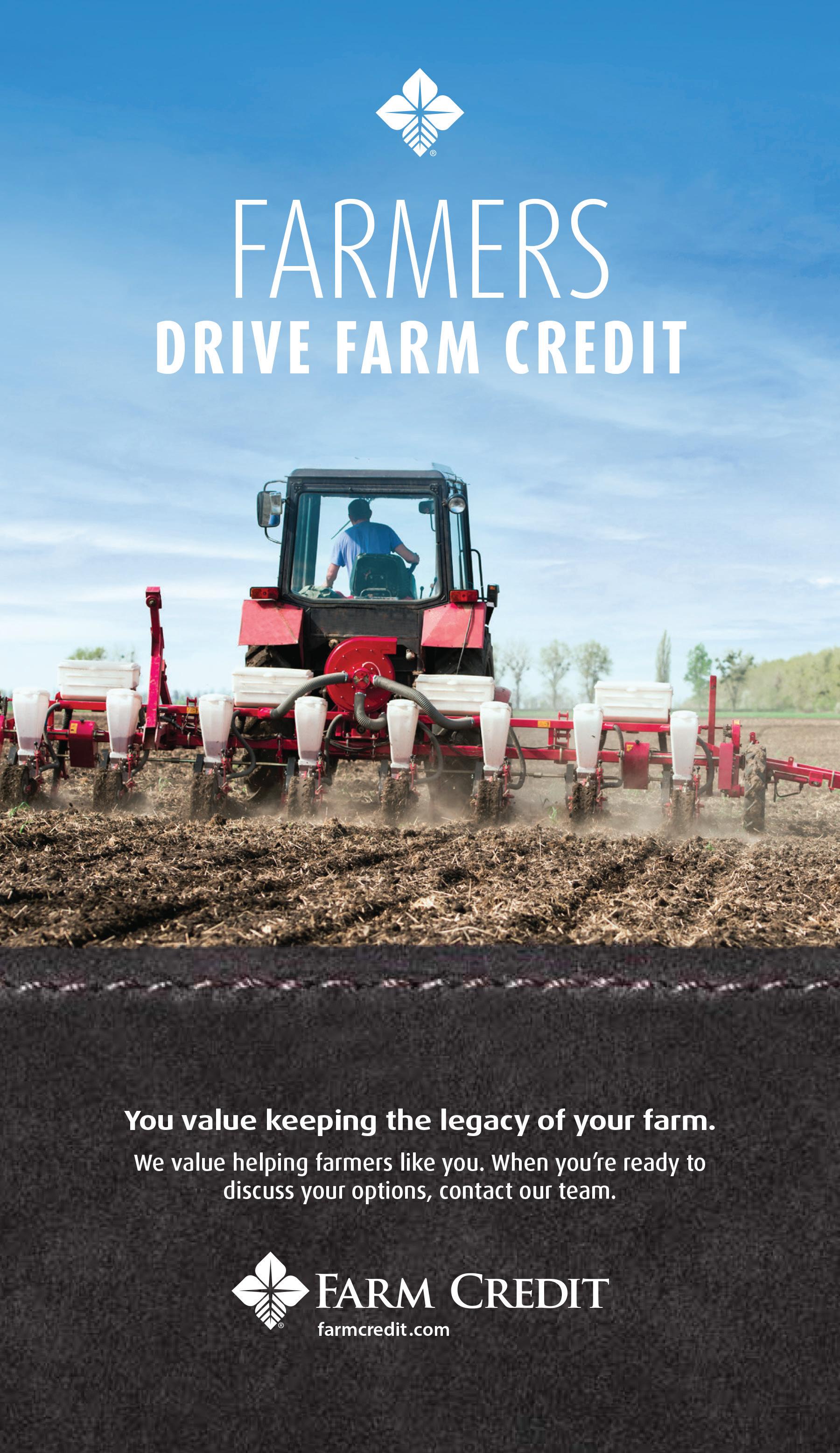
32 VIRGINIA FARM BUREAU NEWS







 BY NICOLE ZEMA
BY NICOLE ZEMA

















































 Kelley, King George County
Kelley, King George County









 ARTICLE AND PHOTOS BY ALICE KEMP
ARTICLE AND PHOTOS BY ALICE KEMP

